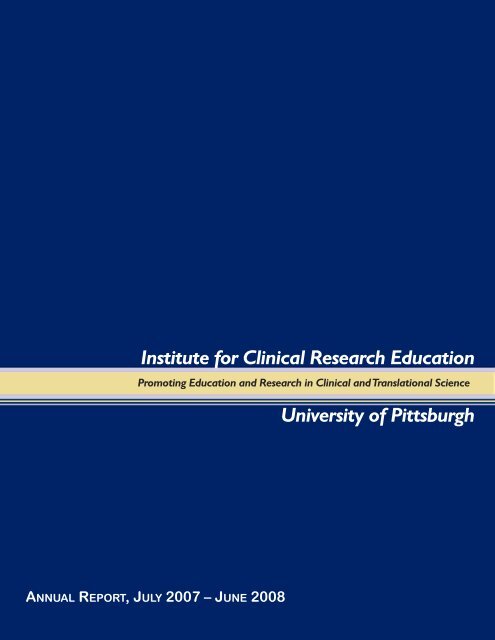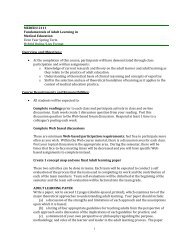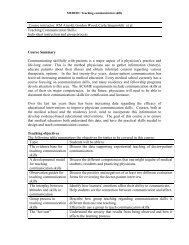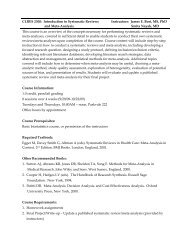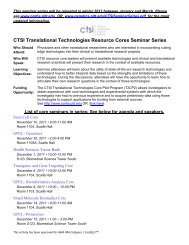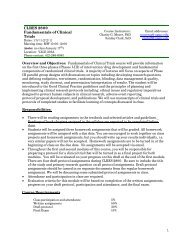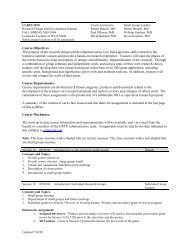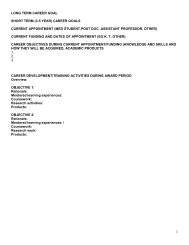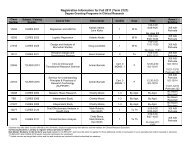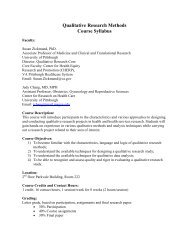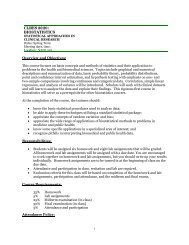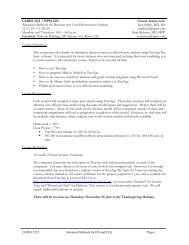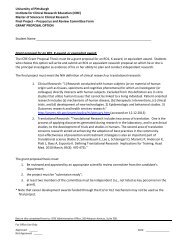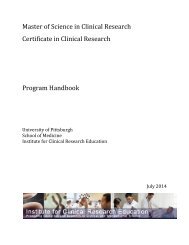Program - Institute for Clinical Research Education - University of ...
Program - Institute for Clinical Research Education - University of ...
Program - Institute for Clinical Research Education - University of ...
Create successful ePaper yourself
Turn your PDF publications into a flip-book with our unique Google optimized e-Paper software.
<strong>Institute</strong> <strong>for</strong> <strong>Clinical</strong> <strong>Research</strong> <strong>Education</strong><br />
Promoting <strong>Education</strong> and <strong>Research</strong> in <strong>Clinical</strong> andTranslational Science<br />
<strong>University</strong> <strong>of</strong> Pittsburgh<br />
ANNUAL REPORT, JULY 2007 – JUNE 2008
Table <strong>of</strong> Contents<br />
Overview: <strong>Institute</strong> <strong>for</strong> <strong>Clinical</strong> <strong>Research</strong> <strong>Education</strong>.................................................................................................... 1<br />
Mission <strong>of</strong> the <strong>Institute</strong> <strong>for</strong> <strong>Clinical</strong> <strong>Research</strong> <strong>Education</strong> ............................................................................................. 2<br />
Advanced Training and Degree <strong>Program</strong>s in <strong>Clinical</strong> and Translational <strong>Research</strong>..................................................... 3<br />
Letter from the Senior Vice Chancellor <strong>for</strong> the Health Sciences ................................................................................. 4<br />
Letter from the Director <strong>of</strong> the <strong>Institute</strong> <strong>for</strong> <strong>Clinical</strong> <strong>Research</strong> <strong>Education</strong> .................................................................... 5<br />
Letter from the Director <strong>of</strong> the <strong>Clinical</strong> and Translational Science <strong>Institute</strong>................................................................. 6<br />
CTSI <strong>Research</strong> <strong>Education</strong> and Career Development Steering Committee................................................................. 7<br />
<strong>Clinical</strong> and Translational Science Degree <strong>Program</strong>s ................................................................................................. 9<br />
Career Development and <strong>Research</strong> Training <strong>Program</strong>s ............................................................................................. 16<br />
Curriculum Development in Translational Science...................................................................................................... 27<br />
Competencies in <strong>Clinical</strong> and Translational Science................................................................................................... 28<br />
ICRE Collaborative <strong>Program</strong>s in <strong>Clinical</strong> and Translational Science........................................................................... 29<br />
ICRE Core Faculty ...................................................................................................................................................... 32<br />
<strong>University</strong> <strong>of</strong> Pittsburgh<br />
<strong>Institute</strong> <strong>for</strong> <strong>Clinical</strong> <strong>Research</strong> <strong>Education</strong><br />
200 Meyran Avenue<br />
Pittsburgh, PA 15213<br />
412-586-9632<br />
www.icre.pitt.edu
Overview: <strong>Institute</strong> <strong>for</strong> <strong>Clinical</strong> <strong>Research</strong> <strong>Education</strong><br />
The <strong>University</strong> <strong>of</strong> Pittsburgh has a distinguished history <strong>of</strong> and established infrastructure <strong>for</strong> successfully training medical<br />
students, residents, postdoctoral fellows, and junior faculty in clinical and translational research and supporting their<br />
career development. At the heart <strong>of</strong> the training enterprise is the <strong>Institute</strong> <strong>for</strong> <strong>Clinical</strong> <strong>Research</strong> <strong>Education</strong> (ICRE).<br />
Founded in 2006, the ICRE is devoted to the development <strong>of</strong> high-quality clinical and translational researchers throughoutthe<br />
schools <strong>of</strong> the health sciences: the School <strong>of</strong> Medicine, the Graduate School <strong>of</strong> Public Health, the School <strong>of</strong> Dental<br />
Medicine, the School <strong>of</strong> Health and Rehabilitation Sciences, the School <strong>of</strong> Nursing, and the School <strong>of</strong> Pharmacy. The<br />
ICRE has core faculty members and mentors from the disciplines represented in each <strong>of</strong> the six schools, and it is<br />
designed to <strong>of</strong>fer opportunities in clinical and translational studies ranging from brief research experiences to doctoral<br />
degree programs. In addition to <strong>of</strong>fering training programs that lead to a PhD in <strong>Clinical</strong> and Translational Science, a<br />
Master <strong>of</strong> Science in <strong>Clinical</strong> <strong>Research</strong>, and a Certificate in <strong>Clinical</strong> <strong>Research</strong>, the ICRE provides the foundation <strong>for</strong><br />
the Multidisciplinary <strong>Clinical</strong> <strong>Research</strong> Scholars <strong>Program</strong>, the <strong>Clinical</strong> Scientist Training <strong>Program</strong> <strong>for</strong> medical students<br />
and residents, and other programs <strong>for</strong> trainees at all stages <strong>of</strong> the career pipeline.<br />
With the advent <strong>of</strong> the <strong>Clinical</strong> and Translational Science Awards (CTSAs), the ICRE has strategically built upon its<br />
existing programs to create a strong infrastructure <strong>for</strong> the <strong>Research</strong> <strong>Education</strong> and Career Development Core <strong>of</strong> the <strong>Clinical</strong><br />
and Translational Science <strong>Institute</strong> (CTSI), to coordinate ef<strong>for</strong>ts across the schools <strong>of</strong> the health sciences, to enhance<br />
existing <strong>of</strong>ferings, to reduce boundaries between the schools and disciplines, and to meet the overall aims <strong>of</strong> the CTSI.<br />
1
Mission <strong>of</strong> the <strong>Institute</strong> <strong>for</strong><br />
<strong>Clinical</strong> <strong>Research</strong> <strong>Education</strong><br />
The ICRE is home to the <strong>University</strong> <strong>of</strong> Pittsburgh’s premier clinical and translational science training<br />
programs and to the <strong>Research</strong> <strong>Education</strong> and Career Development Core <strong>of</strong> the <strong>Clinical</strong> and<br />
Translational Science <strong>Institute</strong> (CTSI).<br />
The ICRE’s mission is to develop, nurture, and support careers in clinical and translational research.<br />
Its ultimate goals are to advance the field <strong>of</strong> clinical and translational science and to help meet the<br />
nation’s need <strong>for</strong> researchers and leaders in this field.<br />
New Student Enrollment by <strong>Program</strong>s<br />
140<br />
120<br />
100<br />
80<br />
60<br />
40<br />
20<br />
0<br />
2000<br />
2001<br />
2002<br />
2003<br />
2004<br />
2005<br />
2006<br />
2007<br />
2008*<br />
PhD Trainees CEED Scholars<br />
TL1 Trainees CSTP Medical Students<br />
<strong>Clinical</strong> <strong>Research</strong> MS and Certificate Trainees<br />
Medical <strong>Education</strong> MS and Certificate Trainees<br />
CRSP Scholars<br />
CSTP/ISP Residents<br />
* Projected <strong>for</strong> July 1, 2008<br />
2
Advanced Training and Degree <strong>Program</strong>s<br />
in <strong>Clinical</strong> and Translational <strong>Research</strong><br />
<strong>Institute</strong> <strong>for</strong> <strong>Clinical</strong> <strong>Research</strong> <strong>Education</strong><br />
ICRE Faculty<br />
Wishwa Kapoor, MD, Director<br />
Doris Rubio, PhD, Co-Director<br />
Nicole Fowler, MHSA, Assistant Director<br />
Patrick Reitz, MA, Administrator<br />
ICRE Advisory<br />
Committee/CTSI <strong>Education</strong><br />
Core Steering Committee<br />
Degree<br />
<strong>Program</strong>s<br />
<strong>Research</strong>Training and<br />
Career Development <strong>Program</strong>s<br />
<strong>Research</strong> and<br />
<strong>Education</strong> Resources<br />
Office <strong>of</strong><br />
Evaluation<br />
Office <strong>of</strong><br />
Lifelong Learning<br />
PhD in <strong>Clinical</strong> and<br />
Translational Science<br />
<strong>Clinical</strong> <strong>Research</strong><br />
Scholars (KL2)<br />
<strong>Program</strong><br />
Design, Biostatistics,<br />
and Ethics Core<br />
<strong>University</strong> <strong>of</strong><br />
Pittsburgh CTSI<br />
Evaluation Core<br />
Master <strong>of</strong> Science<br />
in <strong>Clinical</strong> <strong>Research</strong><br />
Master <strong>of</strong> Science<br />
in Medical <strong>Education</strong><br />
Certificate<br />
in <strong>Clinical</strong> <strong>Research</strong><br />
Certificate in<br />
<strong>Clinical</strong> and<br />
Translational<br />
<strong>Research</strong> <strong>for</strong><br />
Doctoral Students<br />
in the<br />
Health Sciences<br />
CEED <strong>Program</strong><br />
<strong>Clinical</strong> Scientist<br />
Training <strong>Program</strong><br />
<strong>for</strong> Residents<br />
<strong>Clinical</strong> Scientist<br />
Training <strong>Program</strong><br />
<strong>for</strong> Medical Students<br />
Doris Duke <strong>Clinical</strong><br />
<strong>Research</strong> Fellowship<br />
<strong>for</strong> Medical Students<br />
CRHC Data Center<br />
Web-BasedTeaching<br />
Laboratory<br />
Mentoring <strong>Program</strong><br />
<strong>Research</strong> on<br />
<strong>Research</strong> <strong>Education</strong><br />
<strong>University</strong> <strong>of</strong><br />
PittsburghT32/T35<br />
<strong>Program</strong>s<br />
Certificate<br />
in Medical <strong>Education</strong><br />
TL1 <strong>Program</strong>s<br />
(Long-Term and<br />
START UP)<br />
<strong>Clinical</strong> and<br />
Translational Science<br />
Common Core<br />
Curriculum<br />
CEED denotes Career <strong>Education</strong> and Enhancement <strong>for</strong> Health Care <strong>Research</strong> Diversity; CRHC, Center <strong>for</strong> <strong>Research</strong> on Health<br />
Care; CTSI, <strong>Clinical</strong> and Translational Science <strong>Institute</strong>; ICRE, <strong>Institute</strong> <strong>for</strong> <strong>Clinical</strong> <strong>Research</strong> <strong>Education</strong>; and START UP,<br />
Short-Term Access to <strong>Research</strong> Training <strong>Program</strong>.<br />
3
Arthur Levine, MD<br />
Senior Vice Chancellor, Health Sciences<br />
Dean, School <strong>of</strong> Medicine<br />
Since 2005, the <strong>University</strong> <strong>of</strong> Pittsburgh’s <strong>Institute</strong> <strong>for</strong> <strong>Clinical</strong> <strong>Research</strong> <strong>Education</strong> (ICRE) has grown into one <strong>of</strong> the<br />
premier clinical and translational research training programs in the nation.<br />
Beginning with an active master’s degree program and now <strong>of</strong>fering more than 20 training and career development<br />
programs, the ICRE has established the <strong>University</strong>’s schools <strong>of</strong> the health sciences as leaders in clinical and<br />
translational science education. The ICRE is a manifestation <strong>of</strong> our strong commitment to addressing the shortage<br />
<strong>of</strong> physician and clinical investigators, a group considered an “endangered species.”<br />
The success <strong>of</strong> the ICRE programs was instrumental in securing funding from the National <strong>Institute</strong>s <strong>of</strong> Health to<br />
establish the <strong>Clinical</strong> and Translational Science <strong>Institute</strong> (CTSI). The purpose <strong>of</strong> the CTSI is to advance the nation’s<br />
clinical research agenda by accelerating the movement <strong>of</strong> basic science discoveries from the researcher’s bench to<br />
the patient’s bedside and applying the discoveries to the prevention and treatment <strong>of</strong> disease. Through its educational<br />
<strong>of</strong>ferings, the CTSI can train future investigators and reduce the critical national shortage <strong>of</strong> physicians who can be<br />
successful and independent clinical and translational researchers.<br />
I believe that progress toward improving the health and well-being <strong>of</strong> the nation’s citizens will be achieved only<br />
through the translation <strong>of</strong> basic research findings into the clinical arena, with ongoing follow-up and rigorous evaluation <strong>of</strong><br />
outcomes. The Rosetta stone <strong>for</strong> this translation lies at the heart <strong>of</strong> the ICRE mission in the training <strong>of</strong> the nation’s<br />
growing cadre <strong>of</strong> clinical researchers working in multidisciplinary teams.<br />
Arthur S. Levine, MD<br />
Senior Vice Chancellor, Health Sciences<br />
Dean, School <strong>of</strong> Medicine<br />
4
Wishwa Kapoor, MD, MPH<br />
Director, <strong>Institute</strong> <strong>for</strong><br />
<strong>Clinical</strong> <strong>Research</strong> <strong>Education</strong><br />
This past year was a time <strong>of</strong> major accomplishment <strong>for</strong> the <strong>Institute</strong> <strong>for</strong> <strong>Clinical</strong> <strong>Research</strong> <strong>Education</strong> (ICRE). From July<br />
2007 to June 2008, we fully completed the implementation <strong>of</strong> research training programs <strong>for</strong> the pipeline <strong>of</strong> investigators<br />
from medical students to faculty, and we developed educational opportunities <strong>for</strong> the entire spectrum <strong>of</strong> training from<br />
exposure to mastery <strong>of</strong> research skills. Highlights included the following:<br />
• Implementing the program <strong>for</strong> a PhD in <strong>Clinical</strong> and Translational Science and recruiting students into the program.<br />
• Receiving <strong>University</strong> approval <strong>for</strong> PhD students in the schools <strong>of</strong> the health sciences to pursue a Certificate in <strong>Clinical</strong><br />
and Translational <strong>Research</strong>.<br />
• Initiating the Doris Duke <strong>Clinical</strong> <strong>Research</strong> Fellowship <strong>for</strong> Medical Students and recruiting students <strong>for</strong> the fellowship<br />
program from various universities.<br />
• Witnessing the success <strong>of</strong> the <strong>Clinical</strong> <strong>Research</strong> Scholars <strong>Program</strong>, designed to support the career development <strong>of</strong> faculty<br />
who are drawn from multiple disciplines and are conducting cutting-edge translational research.<br />
• Launching the Career <strong>Education</strong> and Enhancement <strong>for</strong> Health Care <strong>Research</strong> Diversity (CEED) <strong>Program</strong>, created to<br />
support the research careers <strong>of</strong> faculty and postdoctoral students from underrepresented minority groups.<br />
• Offering a Web-based curriculum <strong>for</strong> all <strong>of</strong> our courses.<br />
• Enhancing each <strong>of</strong> our existing programs, with the result that program enrollments and excitement about a career<br />
in clinical and translational research are higher than ever.<br />
We strive <strong>for</strong> excellence in our training and educational programs. Toward this end, we continue to make changes in all<br />
<strong>of</strong> our courses, teaching <strong>for</strong>mats, and program <strong>of</strong>ferings. Working with a national consortium <strong>of</strong> universities that have<br />
received <strong>Clinical</strong> and Translational Science Awards (CTSAs), we have begun an intensive review <strong>of</strong> the competencies in<br />
the field <strong>of</strong> clinical and translational research. The competencies will be reviewed, evaluated, and updated on a regular<br />
basis as the science and education in the field evolve.<br />
I am grateful to the core faculty members who created the ICRE programs and who continue to provide outstanding<br />
teaching in and leadership <strong>of</strong> these programs. I am also grateful to Dr. Arthur Levine, whose unconditional and enthusiastic<br />
support <strong>of</strong> the ICRE has contributed substantially to the ICRE’s success.<br />
Wishwa Kapoor, MD, MPH<br />
Director, <strong>Institute</strong> <strong>for</strong><br />
<strong>Clinical</strong> <strong>Research</strong> <strong>Education</strong><br />
5
Steven Reis, MD<br />
Director, <strong>Clinical</strong> and Translational Science <strong>Institute</strong><br />
As one <strong>of</strong> the twelve initial recipients <strong>of</strong> a <strong>Clinical</strong> and Translational Science Award (CTSA) from the National <strong>Institute</strong>s<br />
<strong>of</strong> Health in 2006, the <strong>University</strong> <strong>of</strong> Pittsburgh founded the <strong>Clinical</strong> and Translational Science <strong>Institute</strong> (CTSI) to<br />
trans<strong>for</strong>m its research enterprise. With $83.5 million in CTSA funding over a five-year period, the CTSI serves as the<br />
academic home to integrate clinical and translational sciences across the <strong>University</strong>’s six health science schools,<br />
Carnegie Mellon <strong>University</strong>, the <strong>University</strong> <strong>of</strong> Pittsburgh Medical Center (UPMC), and the region. The CTSI’s primary<br />
focus is to develop, nurture, and support cadres <strong>of</strong> clinical and translational scientists by building on the <strong>University</strong>’s<br />
existing clinical research training programs, supporting new comprehensive training programs, and providing resources<br />
and opportunities that will facilitate the translation <strong>of</strong> research findings from the bench to the bedside to the community.<br />
One <strong>of</strong> the central elements <strong>of</strong> the CTSI is the CTSI <strong>Research</strong> <strong>Education</strong> and Career Development Core, housed in<br />
the <strong>Institute</strong> <strong>for</strong> <strong>Clinical</strong> <strong>Research</strong> <strong>Education</strong> (ICRE). Over the past year, the ICRE has successfully developed<br />
translational science education and training opportunities across the entire academic pipeline <strong>of</strong> investigators from<br />
medical and health science students to senior faculty investigators. The maturation and expansion <strong>of</strong> the <strong>Clinical</strong><br />
<strong>Research</strong> Scholars <strong>Program</strong> (KL2), the launching <strong>of</strong> a new program leading to the PhD in <strong>Clinical</strong> and Translational<br />
Science, and the receipt <strong>of</strong> a Doris Duke <strong>Clinical</strong> <strong>Research</strong> Fellowship <strong>for</strong> Medical Students are highlights <strong>of</strong> the<br />
ICRE’s accomplishments during 2007–2008.<br />
I am looking <strong>for</strong>ward to the ICRE’s growth during the next year. The ICRE is clearly a national leader in clinical and<br />
translational research training.<br />
Steven Reis, MD<br />
Associate Vice Chancellor <strong>for</strong> <strong>Clinical</strong> <strong>Research</strong>, Health Sciences<br />
Director, <strong>Clinical</strong> and Translational Science <strong>Institute</strong><br />
6
CTSI <strong>Research</strong> <strong>Education</strong> and Career Development Steering Committee<br />
Cindy Bryce, PhD<br />
Associate Pr<strong>of</strong>essor <strong>of</strong> Medicine<br />
Associate Director, ICRE Degree <strong>Program</strong>s<br />
School <strong>of</strong> Medicine<br />
Donald Burke, MD<br />
Dean, Graduate School <strong>of</strong> Public Health<br />
Associate Vice Chancellor <strong>for</strong> Global Health<br />
UPMC–Jonas Salk Chair in Global Health<br />
Lora Burke, PhD, MPH, RN<br />
Associate Pr<strong>of</strong>essor <strong>of</strong> Nursing<br />
School <strong>of</strong> Nursing<br />
Ellen Cohn, PhD<br />
Associate Pr<strong>of</strong>essor, Department <strong>of</strong><br />
Communication Science and Disorders<br />
Associate Dean <strong>for</strong> Instructional Development<br />
School <strong>of</strong> Health and Rehabilitation Sciences<br />
Gregory Cooper, MD, PhD<br />
Associate Pr<strong>of</strong>essor <strong>of</strong> Biomedical In<strong>for</strong>matics,<br />
Computer Science, and Intelligent Systems<br />
Director, Biomedical In<strong>for</strong>matics Training <strong>Program</strong><br />
Vice Chair, Department <strong>of</strong> Biomedical In<strong>for</strong>matics<br />
School <strong>of</strong> Medicine<br />
Janice Dorman, MS, PhD<br />
Associate Pr<strong>of</strong>essor <strong>of</strong> Epidemiology<br />
Associate Dean <strong>for</strong> Scientific and International<br />
Affairs<br />
School <strong>of</strong> Nursing<br />
Kelly Dornin-Koss, MPPM, RN<br />
Director, <strong>Research</strong> Conduct and Compliance<br />
Office<br />
Judith Erlen, PhD, RN<br />
Pr<strong>of</strong>essor and Coordinator, PhD <strong>Program</strong><br />
School <strong>of</strong> Nursing<br />
Beth Fischer, PhD<br />
Assistant Pr<strong>of</strong>essor <strong>of</strong> Medicine<br />
Director, Survival Skills and Ethics <strong>Program</strong><br />
School <strong>of</strong> Medicine<br />
Nicole Fowler, MHSA<br />
Assistant Director, ICRE<br />
<strong>Research</strong> Associate<br />
School <strong>of</strong> Medicine<br />
Susan Greenspan, MD<br />
Pr<strong>of</strong>essor <strong>of</strong> Medicine<br />
Director, Osteoporosis Prevention and<br />
Treatment Center<br />
School <strong>of</strong> Medicine<br />
John Horn, PhD<br />
Associate Dean <strong>of</strong> Graduate Studies<br />
Director, Interdisciplinary Biomedical Graduate <strong>Program</strong><br />
Pr<strong>of</strong>essor <strong>of</strong> Neurobiology<br />
School <strong>of</strong> Medicine<br />
Said Ibrahim, MD, MPH<br />
Associate Pr<strong>of</strong>essor <strong>of</strong> Medicine<br />
VA Center <strong>for</strong> Health Equity <strong>Research</strong> and<br />
Promotion (CHERP)<br />
Director, Career <strong>Education</strong> and Enhancement <strong>for</strong><br />
Health Care <strong>Research</strong> Diversity (CEED) <strong>Program</strong><br />
School <strong>of</strong> Medicine<br />
Wishwa Kapoor, MD, MPH<br />
Falk Pr<strong>of</strong>essor <strong>of</strong> Medicine<br />
Pr<strong>of</strong>essor <strong>of</strong> Health Policy and Management<br />
and <strong>Clinical</strong> and Translational Science<br />
Chief, Division <strong>of</strong> General Internal Medicine<br />
Vice Chair, Department <strong>of</strong> Medicine<br />
Director, ICRE<br />
Director, Center <strong>for</strong> <strong>Research</strong> on Health Care (CRHC)<br />
Co-Director, RAND–<strong>University</strong> <strong>of</strong> Pittsburgh Health <strong>Institute</strong><br />
Co-Director, <strong>Clinical</strong> and Translational Science <strong>Institute</strong><br />
School <strong>of</strong> Medicine<br />
Robert Kraut, PhD<br />
Herbert A. Simon Pr<strong>of</strong>essor <strong>of</strong> Human-Computer<br />
Interaction<br />
Carnegie Mellon <strong>University</strong><br />
Patricia Kroboth, PhD<br />
Dean, School <strong>of</strong> Pharmacy<br />
Pr<strong>of</strong>essor <strong>of</strong> Pharmaceutical Sciences<br />
School <strong>of</strong> Pharmacy<br />
7
CTSI <strong>Research</strong> <strong>Education</strong> and Career Development Steering Committee<br />
Joan Lakoski, PhD<br />
Pr<strong>of</strong>essor <strong>of</strong> Pharmacology<br />
Associate Vice Chancellor <strong>for</strong> Academic Career Development<br />
Associate Dean <strong>for</strong> Postdoctoral <strong>Education</strong><br />
<strong>University</strong> <strong>of</strong> Pittsburgh Health Sciences<br />
Mary Marazita, PhD<br />
Pr<strong>of</strong>essor and Chair <strong>of</strong> Oral Biology<br />
Associate Dean <strong>for</strong> <strong>Research</strong><br />
School <strong>of</strong> Dental Medicine<br />
Margaret McDonald, PhD<br />
Assistant Pr<strong>of</strong>essor <strong>of</strong> Epidemiology and Psychiatry<br />
Associate Vice Chancellor <strong>for</strong> Academic Affairs<br />
<strong>University</strong> <strong>of</strong> Pittsburgh Health Sciences<br />
Kathleen McTigue, MD, MS, MPH<br />
Assistant Pr<strong>of</strong>essor <strong>of</strong> Medicine and Epidemiology<br />
School <strong>of</strong> Medicine<br />
James Osborn, PhD<br />
Executive Director, Healthcare Robotics Center<br />
Carnegie Mellon <strong>University</strong><br />
Samuel Poloyac, PharmD, PhD<br />
Assistant Pr<strong>of</strong>essor <strong>of</strong> Pharmaceutical Sciences<br />
School <strong>of</strong> Pharmacy<br />
Sandra Quinn, PhD<br />
Associate Pr<strong>of</strong>essor <strong>of</strong> Behavioral and Community<br />
Health Sciences<br />
Associate Dean <strong>for</strong> Student Affairs and <strong>Education</strong><br />
Graduate School <strong>of</strong> Public Health<br />
James Roberts, MD<br />
Pr<strong>of</strong>essor <strong>of</strong> Obstetrics, Gynecology, and Reproductive<br />
Sciences and Epidemiology<br />
Vice Chair <strong>of</strong> <strong>Research</strong>, Department <strong>of</strong> Obstetrics,<br />
Gynecology, and Reproductive Sciences<br />
School <strong>of</strong> Medicine<br />
Mark Roberts, MD, MPP<br />
Pr<strong>of</strong>essor <strong>of</strong> Medicine, Health Policy and<br />
Management, and Industrial Engineering<br />
Chief, Section <strong>of</strong> Decision Sciences and <strong>Clinical</strong><br />
Systems Modeling<br />
School <strong>of</strong> Medicine<br />
Howard Rockette Jr., PhD<br />
Pr<strong>of</strong>essor and Chair, Department <strong>of</strong> Biostatistics<br />
Graduate School <strong>of</strong> Public Health<br />
Doris Rubio, PhD<br />
Associate Pr<strong>of</strong>essor <strong>of</strong> Medicine, Biostatistics, Nursing,<br />
and <strong>Clinical</strong> and Translational Science<br />
Co-Director, ICRE<br />
Director, CRHC Data Center<br />
Co-Director, <strong>Clinical</strong> <strong>Research</strong> Scholars <strong>Program</strong><br />
CTSI Core Director, Design, Biostatistics, and<br />
<strong>Clinical</strong> <strong>Research</strong> Ethics Core<br />
CTSI Core Director, Evaluation Core<br />
School <strong>of</strong> Medicine<br />
Deborah Seltzer<br />
<strong>Research</strong> Associate<br />
School <strong>of</strong> Medicine<br />
Daniel Siewiorek, PhD<br />
Pr<strong>of</strong>essor <strong>of</strong> Computer Science<br />
Director, Human-Computer Interaction <strong>Institute</strong><br />
Buhl <strong>University</strong> Pr<strong>of</strong>essor <strong>of</strong> Electrical and<br />
Computer Engineering and Computer Science<br />
Carnegie Mellon <strong>University</strong><br />
Randall Smith, PhD<br />
Pr<strong>of</strong>essor <strong>of</strong> Pharmacy<br />
Associate Dean <strong>for</strong> <strong>Research</strong><br />
School <strong>of</strong> Pharmacy<br />
Stephanie Studenski, MD, MPH<br />
Pr<strong>of</strong>essor <strong>of</strong> Medicine<br />
Director, Claude D. Pepper Independence Center<br />
School <strong>of</strong> Medicine<br />
Galen Switzer, PhD<br />
Associate Pr<strong>of</strong>essor <strong>of</strong> Medicine and Psychiatry<br />
Associate Director, VA Center <strong>for</strong> Health Equity<br />
<strong>Research</strong> and Promotion<br />
Co-Chief, Measurement Core<br />
VA Pittsburgh Healthcare System<br />
Stephen Thomas, PhD<br />
Pr<strong>of</strong>essor <strong>of</strong> Behavioral and Community Health Sciences<br />
Director, Center <strong>for</strong> Minority Health<br />
Graduate School <strong>of</strong> Public Health<br />
Robert Weyant, DMD, DrPH<br />
Pr<strong>of</strong>essor and Chair<br />
Department <strong>of</strong> Dental Public Health and<br />
In<strong>for</strong>mation Management<br />
Associate Dean, Office <strong>of</strong> Public Health<br />
and Outreach<br />
School <strong>of</strong> Dental Medicine<br />
8
<strong>Clinical</strong> and Translational Science Degree <strong>Program</strong>s<br />
The <strong>Institute</strong> <strong>for</strong> <strong>Clinical</strong> <strong>Research</strong> <strong>Education</strong> at the <strong>University</strong> <strong>of</strong> Pittsburgh has developed customized<br />
courses and advanced training programs to meet the needs <strong>of</strong> clinical and translational<br />
researchers at every stage. Our courses emphasize the multidisciplinary nature <strong>of</strong> clinical<br />
and translational research and engage adult learners by focusing on applied approaches to<br />
designing and conducting sound and ethical research.<br />
ICRE Curriculum Committee<br />
David Barnard, PhD, JD<br />
Amber Barnato, MD, MPH, MS<br />
Cindy Bryce, PhD<br />
Joyce Chang, PhD<br />
Nicole Fowler, MHSA<br />
Jennifer Grandis, MD<br />
Wishwa Kapoor, MD, MPH<br />
Karen Matthews, PhD<br />
Kathleen McTigue, MD, MS, MPH<br />
Mark Mooney, PhD<br />
Charity Moore, PhD<br />
Kumaravel Rajakumar, MD<br />
Mark Roberts, MD, MPP<br />
Doris Rubio, PhD<br />
Kenneth Smith, MD, MS<br />
Stephanie Studenski, MD, MPH<br />
Galen Switzer, PhD<br />
Medical <strong>Education</strong> Curriculum Committee<br />
Rachel Bonnema, MD<br />
Robert Brooks, MD, PhD<br />
Cindy Bryce, PhD<br />
D. Michael Elnicki, MD<br />
Rosanne Granieri, MD<br />
Scott Herrle, MD<br />
Dena H<strong>of</strong>kosh, MD<br />
Steven Kanter, MD<br />
Wishwa Kapoor, MD, MPH<br />
Alan Lesgold, PhD<br />
David Macpherson, MD, MPH<br />
Haruka Matsubara, MD<br />
J.B. McGee, MD<br />
Melissa McNeil, MD, MPH<br />
Dianna Plo<strong>of</strong>, EdD<br />
Jeannette South-Paul, MD<br />
Reed Van Deusen, MD<br />
9
PhD in <strong>Clinical</strong> and Translational Science<br />
<strong>Program</strong> Leadership:<br />
Mark Roberts, MD, MPP, Co-Director<br />
Galen Switzer, PhD, Co-Director<br />
Nicole Fowler, MHSA, <strong>Program</strong> Administrator<br />
Benjamin Huffman, <strong>Program</strong> Coordinator<br />
<strong>Program</strong> Committee:<br />
Cindy Bryce, PhD<br />
<strong>Institute</strong> <strong>for</strong> <strong>Clinical</strong> <strong>Research</strong> <strong>Education</strong><br />
Wendy Chapman, PhD<br />
Department <strong>of</strong> Biomedical In<strong>for</strong>matics<br />
John Horn, PhD<br />
Associate Dean <strong>for</strong> Graduate Studies<br />
Wishwa Kapoor, MD, MPH<br />
<strong>Institute</strong> <strong>for</strong> <strong>Clinical</strong> <strong>Research</strong> <strong>Education</strong><br />
Doris Rubio, PhD<br />
<strong>Institute</strong> <strong>for</strong> <strong>Clinical</strong> <strong>Research</strong> <strong>Education</strong>, Center <strong>for</strong> <strong>Research</strong> on Health Care Data Center<br />
Clayton Wiley, MD, PhD<br />
Department <strong>of</strong> Pathology, Medical Scientist Training <strong>Program</strong><br />
The PhD in <strong>Clinical</strong> and Translational Science is the newest degree <strong>of</strong>fering <strong>of</strong> the ICRE and is a central component <strong>of</strong><br />
the CTSI educational core. The PhD program is a rigorous training program designed to teach clinicians to conduct<br />
high-quality clinical and translational research.<br />
The program provides trainees with advanced knowledge <strong>of</strong> research concepts and gives them the skills and opportunities<br />
to conduct innovative research and develop into independent investigators.<br />
Modeled after the highly successful and individually tailored PhD curriculum in the basic sciences, the didactic curriculum<br />
in clinical and translational science <strong>of</strong>fers courses in clinical research methods and analytic methods, with advanced<br />
requirements in the specific methodologies that trainees will need to complete their research specialization. Directed,<br />
mentored research begins early in the program, allowing trainees to develop expertise in planning and conducting an<br />
independent research project that will become the basis <strong>of</strong> their dissertation.<br />
As with all <strong>of</strong> the ICRE programs, the PhD program encourages multidisciplinary work. It provides multidisciplinary<br />
mentoring and requires that dissertation committees have representation from two or more disparate disciplines.<br />
10
PhD in <strong>Clinical</strong> and Translational Science<br />
Curriculum <strong>for</strong> the PhD<br />
Spring Fall Summer<br />
Year 1 Year 2 Year 3<br />
Measurements<br />
(1 credit)<br />
Computer Methods<br />
(1 credit)<br />
Biostatistics<br />
(4 credits)<br />
Introduction<br />
to <strong>Clinical</strong><br />
<strong>Research</strong> Methods<br />
(3 credits)<br />
<strong>Research</strong> Design<br />
and Development<br />
(5 credits)<br />
Advanced<br />
“Selectives”<br />
(4 credits)<br />
<strong>Research</strong> Ethics<br />
(1 credit)<br />
Advanced<br />
“Selectives”<br />
(6 credits)<br />
Preliminary Examination<br />
Laboratory Methods<br />
(2 credits)<br />
Translational<br />
Science<br />
(2 credits)<br />
<strong>Research</strong><br />
Specializaton<br />
Combination <strong>of</strong><br />
directed research or<br />
elective coursework<br />
(24 credits)<br />
Comprehensive Examination<br />
Prospectus<br />
Overview<br />
(3 credits minimum)<br />
Dissertation<br />
<strong>Research</strong><br />
(1-10 credits)<br />
Admission to Candidacy<br />
Subsequent<br />
Years<br />
Dissertation<br />
<strong>Research</strong><br />
(1-10 credits)<br />
Dissertation<br />
<strong>Research</strong><br />
(1-10 credits)<br />
Analytic Methods<br />
Prospectus Overview<br />
<strong>Clinical</strong> <strong>Research</strong> Methods<br />
Dissertation Defense<br />
Dissertation <strong>Research</strong><br />
Multidisciplinary Methods<br />
<strong>Research</strong> Specialization Courses<br />
The July 2008 Inaugural Class<br />
Brian Primack, MD, EdM, MS<br />
Assistant Pr<strong>of</strong>essor<br />
Division <strong>of</strong> General Internal Medicine<br />
Department <strong>of</strong> Medicine<br />
Ahmad Tarhini, MD, MS<br />
Assistant Pr<strong>of</strong>essor<br />
Division <strong>of</strong> Hematology/Oncology<br />
Department <strong>of</strong> Medicine<br />
Hussein Tawbi, MD, MS<br />
Assistant Pr<strong>of</strong>essor<br />
Division <strong>of</strong> Hematology/Oncology<br />
Department <strong>of</strong> Medicine<br />
<strong>Research</strong> Topic: The relationship between media<br />
messages (i.e., television, advertising, and popular<br />
music) and adolescent health behaviors such as smoking,<br />
alcohol use, and sexual behavior.<br />
<strong>Research</strong> Topic: Translational research to test the safety<br />
and immunogenicity <strong>of</strong> a triple peptide vaccine designed to<br />
improve the efficacy <strong>of</strong> immunization and to better<br />
immunize patients with advanced melanoma.<br />
<strong>Research</strong> Topic: Investigating the effect <strong>of</strong> epigenetic<br />
modifications on the expression <strong>of</strong> DNA repair genes and<br />
the clinical response <strong>of</strong> patients with melanoma.<br />
11
Master <strong>of</strong> Science and Certificate<br />
<strong>Program</strong>s in <strong>Clinical</strong> and Translational Science<br />
<strong>Program</strong> Leadership:<br />
Mark Roberts, MD, MPP, Director<br />
Cindy Bryce, PhD, Associate Director<br />
Jennifer Kush, <strong>Program</strong> Coordinator<br />
Jessica Dornin, Student Services Coordinator<br />
Initially funded in 1999 under the K30 mechanism <strong>of</strong> the National <strong>Institute</strong>s <strong>of</strong> Health (NIH), the program leading to a<br />
Master <strong>of</strong> Science (MS) in <strong>Clinical</strong> <strong>Research</strong> has become a national model <strong>for</strong> programs to educate clinical trainees at<br />
multiple levels, including medical students, residents, fellows, and junior faculty.<br />
The MS curriculum provides a basic set <strong>of</strong> knowledge and skills that every clinical investigator needs, regardless <strong>of</strong><br />
the specific field in which he or she conducts patient-oriented research. The basics include clinical research methods,<br />
biostatistics, measurement <strong>of</strong> outcomes, and ethical and regulatory principles regarding human research. The core<br />
curriculum serves as the central didactic experience <strong>for</strong> a variety <strong>of</strong> ICRE training programs and consists <strong>of</strong> a tightly<br />
integrated series <strong>of</strong> courses focusing on topics, problems, and skills acquisition across the various content areas.<br />
The summer coursework is followed by a course in grant writing. This course is required <strong>for</strong> the MS and builds on<br />
in<strong>for</strong>mation that is provided through two seminar series: the <strong>Research</strong> Design and Development Series and the Ethics<br />
and Regulation <strong>of</strong> <strong>Clinical</strong> <strong>Research</strong> Series. In these seminar series, students learn how to develop a research question<br />
into an NIH-style grant proposal, how to identify and deal with potential problems related to the protection <strong>of</strong> human<br />
subjects, and how to prepare a protocol <strong>for</strong> the Institutional Review Board. The final product is a completed grant<br />
application that follows the PHS-398 application <strong>for</strong>mat.<br />
12
Master <strong>of</strong> Science and Certificate<br />
<strong>Program</strong>s in <strong>Clinical</strong> and Translational Science<br />
Typical Two-Year <strong>Program</strong><br />
Year 1 Year 2<br />
Computer<br />
Methods<br />
<strong>Research</strong> Design and Development<br />
Biostatistics<br />
<strong>Research</strong><br />
Ethics<br />
<strong>Clinical</strong> <strong>Research</strong> Project<br />
Introduction to<br />
<strong>Clinical</strong> <strong>Research</strong><br />
Methods<br />
<strong>Clinical</strong> <strong>Research</strong> Project<br />
Measurements<br />
Specialty Track<br />
Elective Courses<br />
Specialty Track<br />
Elective Courses<br />
Specialty Track<br />
Elective Courses<br />
Specialty Track<br />
Elective Courses<br />
Summer Fall Spring Fall Spring<br />
Specialty Tracks<br />
Specialty tracks, distinguished primarily along methodological grounds, have allowed trainees to concentrate on the<br />
type <strong>of</strong> research that they plan to participate in during their careers.<br />
<strong>Clinical</strong> Trials <strong>Research</strong> Track (Charity Moore, PhD, Director)<br />
This track provides training in the design, implementation, and analysis <strong>of</strong> experimental studies (phase 1, 2, and 3<br />
trials) through didactic and practical experiences. Trainees are encouraged to direct a clinical trial <strong>for</strong> which they<br />
develop the protocol, manage the study, and analyze the results.<br />
Effectiveness, Outcomes, and Quality <strong>Research</strong> Track (Mark Roberts, MD, MPP, Director)<br />
This track provides training in health services research. The courses <strong>of</strong>fer more sophisticated skills in analytic methods<br />
(especially as they relate to observational data), outcomes measurement, and cost-effectiveness studies.<br />
Health and Behavior Track (Karen Matthews, PhD, Director)<br />
This track focuses on behavioral factors involved in the etiology and treatment <strong>of</strong> physical illness, with an emphasis<br />
on intrapersonal, interpersonal, and sociocultural processes and how they interact.<br />
Translational <strong>Research</strong> Track (Jennifer Grandis, MD, Director)<br />
The trainees in this research track have previous or concurrent laboratory experience or plan to partner with a basic<br />
science investigator to implement translational research projects in the clinical setting. Trainees participate in the<br />
Translational <strong>Research</strong> Seminar Series and take courses related to T1 or T2 translational research.<br />
13
Certificate in <strong>Clinical</strong> and Translational <strong>Research</strong> <strong>for</strong><br />
Doctoral Students in the Health Sciences<br />
<strong>Program</strong> Leadership:<br />
Mark Roberts, MD, MPP, Director<br />
Cindy Bryce, PhD, Associate Director<br />
Jennifer Kush, Coordinator<br />
Jessica Dornin, Student Services Coordinator<br />
Starting in the fall <strong>of</strong> 2008, the ICRE will provide doctoral students in the <strong>University</strong> <strong>of</strong> Pittsburgh’s schools <strong>of</strong> the<br />
health sciences with the opportunity to enroll in a program that leads to a Certificate in <strong>Clinical</strong> and Translational<br />
<strong>Research</strong>. In addition to <strong>of</strong>fering courses in research methodology, the rigorous program will give students the chance<br />
to participate in collaborative research under the mentorship <strong>of</strong> translational researchers.<br />
The goal <strong>of</strong> the certificate program is to enhance the <strong>University</strong>’s doctoral training programs in various areas <strong>of</strong> basic<br />
science and health-related sciences by providing students with a new opportunity to learn the skills needed to conduct<br />
high-quality clinical and translational research.<br />
The certificate is available to graduate students in the programs listed below.<br />
Graduate School <strong>of</strong> Public Health<br />
Behavioral and Community Health Sciences<br />
Biostatistics<br />
Environmental and Occupational Health<br />
Epidemiology<br />
Health Services <strong>Research</strong> and Policy<br />
Human Genetics<br />
Infectious Diseases and Microbiology<br />
Public Health Statistics<br />
DrPH<br />
PhD<br />
PhD<br />
PhD<br />
PhD<br />
PhD<br />
DrPH, PhD<br />
DrPH<br />
School <strong>of</strong> Health and Rehabilitation Sciences<br />
Communication Science and Disorders PhD<br />
Rehabilitation Science<br />
PhD<br />
School <strong>of</strong> Nursing<br />
Nursing<br />
PhD<br />
School <strong>of</strong> Medicine<br />
Biochemistry and Molecular Genetics<br />
Biomedical In<strong>for</strong>matics<br />
Cell Biology and Molecular Physiology<br />
Cellular and Molecular Pathology<br />
Computational Biology<br />
Immunology<br />
Integrative Molecular Biology<br />
Molecular Biophysics and Structural Biology<br />
Molecular Pharmacology<br />
Molecular Virology and Microbiology<br />
Neurobiology<br />
School <strong>of</strong> Pharmacy<br />
Pharmaceutical Sciences<br />
PhD<br />
PhD<br />
PhD<br />
PhD<br />
PhD<br />
PhD<br />
PhD<br />
PhD<br />
PhD<br />
PhD<br />
PhD<br />
PhD<br />
14
Master <strong>of</strong> Science and Certificate in Medical <strong>Education</strong><br />
<strong>Program</strong> Leadership:<br />
Rosanne Granieri, MD, Director<br />
Cindy Bryce, PhD, Associate Director<br />
Jennifer Kush, <strong>Program</strong> Coordinator<br />
The <strong>University</strong> <strong>of</strong> Pittsburgh <strong>of</strong>fers a program that leads to a Master <strong>of</strong> Science (MS) in Medical <strong>Education</strong> and a<br />
Certificate in Medical <strong>Education</strong>. The program is designed to train future leaders in the field.<br />
The program provides trainees with didactic material and precepted teaching experiences that enhance their skills<br />
in classroom and clinical instruction, curriculum development, pr<strong>of</strong>essional leadership, medical education, and<br />
medical administration.<br />
In addition, through the MS program in clinical research, the trainees take core courses in research and complete a<br />
mentored research or curriculum development project.<br />
MS and Certificate Trainees<br />
in Medical <strong>Education</strong><br />
14<br />
12<br />
10<br />
8<br />
6<br />
4<br />
2<br />
0<br />
2000<br />
2001<br />
2002<br />
2003<br />
2004<br />
2005<br />
2006<br />
2007<br />
2008*<br />
Medical education active trainees<br />
* Projected <strong>for</strong> July 1, 2008<br />
15
Career Development and <strong>Research</strong> Training <strong>Program</strong>s<br />
The ICRE’s training and career development programs are customized to<br />
meet the needs <strong>of</strong> each researcher’s stage in the academic “career pipeline.”<br />
16
<strong>Clinical</strong> <strong>Research</strong> Scholars (KL2) <strong>Program</strong><br />
<strong>Program</strong> Leadership:<br />
Wishwa Kapoor, MD, MPH, Director<br />
Doris Rubio, PhD, Co-Director<br />
Joan Lakoski, PhD, Co-Director<br />
Heather Johnson, <strong>Program</strong> Coordinator<br />
Lorraine Pollini, Administrative Assistant<br />
The <strong>Clinical</strong> <strong>Research</strong> Scholars <strong>Program</strong> (CRSP) is a multidisciplinary career development program that prepares<br />
scientists from a broad range <strong>of</strong> disciplines, specialties, and subspecialties <strong>for</strong> independent careers in clinical or<br />
translational research. This program brings together the collaborative ef<strong>for</strong>ts <strong>of</strong> the schools <strong>of</strong> the health sciences (the<br />
Graduate School <strong>of</strong> Public Health, the School <strong>of</strong> Dental Medicine, the School <strong>of</strong> Health and Rehabilitation Sciences,<br />
the School <strong>of</strong> Medicine, the School <strong>of</strong> Nursing, and the School <strong>of</strong> Pharmacy), the Swanson School <strong>of</strong> Engineering, the<br />
many multidisciplinary research centers at the <strong>University</strong> <strong>of</strong> Pittsburgh, and the extensive clinical entities that constitute the<br />
<strong>University</strong> <strong>of</strong> Pittsburgh Medical Center (UPMC). CRSP scholars engage in diverse types <strong>of</strong> multidisciplinary clinical<br />
research, including large and small clinical trials, patient-oriented research, epidemiologic studies, health services<br />
research, and translational research. The scholars pursue educational <strong>of</strong>ferings pertaining to research ethics and<br />
regulations, to best practices in clinical research, and to the development <strong>of</strong> management and leadership skills. An<br />
integral component <strong>of</strong> the program involves working in multidisciplinary teams and being mentored by a group <strong>of</strong> highly<br />
experienced, federally funded senior investigators.<br />
2007–2008 CRSP Scholars<br />
Aletha Akers, MD<br />
Obstetrics, Gynecology, and<br />
Reproductive Sciences<br />
Sonya Borrero, MD, MS<br />
Internal Medicine<br />
Julie Donohue, PhD<br />
Health Policy and Management<br />
Kerry Empey, PharmD, PhD<br />
Pharmacy and Therapeutics<br />
Julie Fuchs, MD<br />
Pediatric Surgery<br />
T. Clark Gamblin, MD<br />
Surgical Oncology<br />
Mary Garza, PhD, MPH<br />
Behavioral and Community<br />
Health Sciences<br />
Andrew Gilbert, MD<br />
Psychiatry<br />
Steven Handler, MD, MS, CMD<br />
Geriatric Medicine and<br />
Biomedical In<strong>for</strong>matics<br />
Samay Jain, MD<br />
Neurology<br />
Jordan Karp, MD<br />
Psychiatry and Anesthesiology<br />
Eswar Krishnan, MD<br />
Rheumatology<br />
Bruce Lee, MD, MBA<br />
Internal Medicine<br />
Steven Little, PhD<br />
Bioengineering<br />
John McKinnon, MD, MSc<br />
Internal Medicine<br />
Ateev Mehrotra, MD, MPH<br />
Internal Medicine<br />
Natalia Morone, MD, MSc<br />
Internal Medicine<br />
Smita Nayak, MD<br />
Internal Medicine<br />
Sara Piva, PhD, PT<br />
Physical Therapy<br />
Camille Ragin, PhD, MPH<br />
Epidemiology<br />
Matthew Reeves, MD, MPH<br />
Obstetrics, Gynecology, and<br />
Reproductive Sciences<br />
Jon Rittenberger, MD, MS<br />
Emergency Medicine<br />
Matthew Rosengart, MD, MPH<br />
Surgery<br />
Marc Simon, MD<br />
Transplant Cardiology<br />
Jason Sperry, MD, MPH<br />
Surgery<br />
Stasa Tadic, MD, MS<br />
Geriatric Medicine<br />
Thankam Thyvalikakath, MDS, MS<br />
Dental In<strong>for</strong>matics<br />
Hilary Tindle, MD, MPH<br />
Internal Medicine<br />
George Tseng, PhD<br />
Biostatistics<br />
Felicia Wu, PhD<br />
Environmental and Occupational<br />
Health<br />
Leland Yee, PhD, MPH<br />
Epidemiology<br />
17
CRSP Multidisciplinary Advisory Committee<br />
The CRSP Multidisciplinary Advisory Committee (MAC) meets every month and includes representatives from 20<br />
disciplines and all six schools <strong>of</strong> the health sciences, faculty from the <strong>University</strong> <strong>of</strong> Pittsburgh Center <strong>for</strong> Minority<br />
Health, and the Associate Dean <strong>of</strong> Graduate Studies in the School <strong>of</strong> Medicine. The committee assists in the selection<br />
<strong>of</strong> CRSP scholars, provides guidance and direction <strong>for</strong> the scholars, monitors the program, and recommends program<br />
changes to meet the scholars’ needs.<br />
2007–2008 Multidisciplinary Advisory Committee<br />
Timothy Billiar, MD<br />
School <strong>of</strong> Medicine<br />
Department <strong>of</strong> Surgery<br />
Gregory Cooper, MD, PhD<br />
School <strong>of</strong> Medicine<br />
Department <strong>of</strong> Bioin<strong>for</strong>matics<br />
Anthony Delitto, PhD, PT<br />
School <strong>of</strong> Health and Rehabilitation<br />
Sciences<br />
Department <strong>of</strong> Physical Therapy<br />
Jacqueline Dunbar-Jacob, PhD, RN<br />
School <strong>of</strong> Nursing<br />
Departments <strong>of</strong> Epidemiology and<br />
Occupational Therapy<br />
Michael Fine, MD, MSc<br />
School <strong>of</strong> Medicine<br />
Departments <strong>of</strong> Medicine and<br />
Health Policy and Management<br />
Gerald Gebhart, PhD<br />
School <strong>of</strong> Medicine<br />
Department <strong>of</strong> Anesthesiology<br />
Susan Greenspan, MD<br />
School <strong>of</strong> Medicine<br />
Division <strong>of</strong> Endocrinology<br />
Mary Beth Happ, PhD, RN<br />
School <strong>of</strong> Nursing<br />
Departments <strong>of</strong> Nursing, Bioethics,<br />
and Health Law<br />
Alejandro Hoberman, MD<br />
School <strong>of</strong> Medicine<br />
Department <strong>of</strong> Pediatrics<br />
John Horn, PhD<br />
School <strong>of</strong> Medicine<br />
Department <strong>of</strong> Neurobiology<br />
Judith Lave, PhD<br />
Graduate School <strong>of</strong> Public Health<br />
Departments <strong>of</strong> Health Policy and<br />
Management, Economics,<br />
and Psychiatry<br />
Mary Marazita, PhD<br />
School <strong>of</strong> Dental Medicine<br />
Departments <strong>of</strong> Oral Biology,<br />
Human Genetics, and Psychiatry<br />
Karen Matthews, PhD<br />
School <strong>of</strong> Medicine<br />
Departments <strong>of</strong> Psychiatry,<br />
Epidemiology, and Psychology<br />
Charity Moore, PhD, MS<br />
School <strong>of</strong> Medicine<br />
Department <strong>of</strong> Medicine<br />
Anne Newman, MD, MPH<br />
Graduate School <strong>of</strong><br />
Public Health<br />
Departments <strong>of</strong> Medicine and<br />
Epidemiology<br />
Steven Reis, MD<br />
School <strong>of</strong> Medicine<br />
Division <strong>of</strong> Cardiology<br />
James Roberts, MD<br />
School <strong>of</strong> Medicine<br />
Department <strong>of</strong> Obstetrics, Gynecology,<br />
and Reproductive Sciences<br />
Mark Roberts, MD, MPP<br />
School <strong>of</strong> Medicine<br />
Departments <strong>of</strong> Medicine, Health<br />
Policy and Management, and<br />
Industrial Engineering<br />
Neal Ryan, MD<br />
School <strong>of</strong> Medicine<br />
Department <strong>of</strong> Psychiatry<br />
Charles Sfeir, DDS, PhD<br />
School <strong>of</strong> Dental Medicine<br />
Department <strong>of</strong> Oral Biology<br />
Randall Smith, PhD<br />
School <strong>of</strong> Pharmacy<br />
Department <strong>of</strong> Pharmaceutical<br />
Sciences<br />
Stephanie Studenski, MD, MPH<br />
School <strong>of</strong> Nursing<br />
Division <strong>of</strong> Geriatrics<br />
Ralph Tarter, PhD<br />
School <strong>of</strong> Medicine<br />
Departments <strong>of</strong> Pharmacology and<br />
Psychiatry<br />
Stephen Thomas, PhD<br />
Graduate School <strong>of</strong> Public Health<br />
Behavioral and Community Health<br />
Sciences<br />
Valerie Watzlaf, PhD, RHIA<br />
School <strong>of</strong> Health and Rehabilitation<br />
Sciences<br />
Department <strong>of</strong> Health In<strong>for</strong>mation<br />
Management<br />
18
Career <strong>Education</strong> and Enhancement <strong>for</strong><br />
Health Care <strong>Research</strong> Diversity (CEED) <strong>Program</strong><br />
<strong>Program</strong> Leadership:<br />
Said Ibrahim, MD, MPH, Director<br />
Heather Johnson, <strong>Program</strong> Coordinator<br />
<strong>Program</strong> Committee:<br />
Willa Doswell, PhD<br />
Nursing<br />
Michael Fine, MD, MSc<br />
Medicine<br />
Beth Fischer, PhD<br />
Medicine<br />
Alejandro Hoberman, MD<br />
Pediatrics<br />
Wishwa Kapoor, MD, MPH<br />
Medicine<br />
Joan Lakoski, PhD<br />
Pharmacology<br />
Charity Moore, PhD, MS<br />
Medicine<br />
Chenits Pettigrew, PhD<br />
Medicine<br />
Julie Price, PhD<br />
Radiology<br />
Edmund Ricci, PhD<br />
Behavioral and Community Health Sciences<br />
Doris Rubio, PhD<br />
Medicine<br />
Deborah Seltzer<br />
Medicine<br />
Jeannette South-Paul, MD<br />
Family Medicine<br />
Stephen Thomas, PhD<br />
Behavioral and Community Health Sciences<br />
The <strong>University</strong> <strong>of</strong> Pittsburgh is committed to becoming a leader in the national ef<strong>for</strong>t to encourage diversity among<br />
clinical and translational researchers. The Career <strong>Education</strong> and Enhancement <strong>for</strong> Health Care <strong>Research</strong> Diversity<br />
(CEED) <strong>Program</strong> is designed to help postdoctoral fellows and faculty from underrepresented minority groups by<br />
providing them with the mentoring and training needed <strong>for</strong> successful research careers; by helping them develop<br />
leadership and management skills; by enhancing their grant writing and other skills that will help them receive<br />
competitive career development awards; and by ensuring a supply <strong>of</strong> well-qualified investigators to carry out basic<br />
science, clinical, and translational research in the health sciences.<br />
2007–2008 CEED Fellows<br />
Danielle Beatty, PhD<br />
Postdoctoral Fellow<br />
Department <strong>of</strong> Psychiatry<br />
School <strong>of</strong> Medicine<br />
James Butler, DrPH, MEd<br />
Assistant Pr<strong>of</strong>essor<br />
Department <strong>of</strong> Behavioral and<br />
Community Health Sciences<br />
Graduate School <strong>of</strong> Public Health<br />
Beatrice Chakraborty, PsyD<br />
Postdoctoral Fellow<br />
Department <strong>of</strong> Psychiatry, Western<br />
Psychiatric <strong>Institute</strong> and Clinic<br />
School <strong>of</strong> Medicine<br />
Craig Fryer, PhD<br />
Assistant Pr<strong>of</strong>essor<br />
Department <strong>of</strong> Behavioral and<br />
Community Health Sciences<br />
Graduate School <strong>of</strong> Public Health<br />
Assistant Director, Center <strong>for</strong><br />
Minority Health<br />
2008–2009 CEED Fellows<br />
Jamie Chatman, PhD<br />
Postdoctoral Fellow<br />
Kellogg Health Scholar<br />
Department <strong>of</strong> Biostatistics<br />
Graduate School <strong>of</strong> Public Health<br />
Tennille Leak, DMD<br />
Postdoctoral Fellow<br />
Department <strong>of</strong> Epidemiology<br />
Graduate School <strong>of</strong> Public Health<br />
Dorothy Hawthorne, RN, PhD<br />
Assistant Pr<strong>of</strong>essor<br />
Department <strong>of</strong> Health Promotion<br />
and Development<br />
School <strong>of</strong> Nursing<br />
Besangie Sellars, PhD<br />
Postdoctoral Fellow<br />
Kellogg Health Scholar<br />
Graduate School <strong>of</strong> Public Health<br />
Center <strong>for</strong> Minority Health<br />
19
<strong>Clinical</strong> Scientist Training <strong>Program</strong> (CSTP) <strong>for</strong> Residents<br />
<strong>Program</strong> Leadership:<br />
Wishwa Kapoor, MD, MPH, Director<br />
Kathleen McTigue, MD, MPH, Associate Director<br />
Jennifer Kush, <strong>Program</strong> Coordinator<br />
The <strong>Clinical</strong> Scientist Training <strong>Program</strong> (CSTP) <strong>for</strong> residents is designed to prepare clinicians <strong>for</strong> a career in academic<br />
medicine and clinical investigation by providing them with opportunities to learn and practice clinical research skills<br />
during their residency training. The program has three main components: courses in clinical research methods,<br />
mentored research, and a longitudinal seminar.<br />
• Each resident in the CSTP completes a minimum <strong>of</strong> 9 credits <strong>of</strong> coursework over an 8-week period,<br />
typically during the summer months <strong>of</strong> the second year <strong>of</strong> residency. Generally, the time <strong>for</strong> the course<br />
work is substituted <strong>for</strong> two electives in the residency training track in which the resident is enrolled.<br />
• During the residency program, each resident develops and carries out a mentored research project in<br />
his or her area <strong>of</strong> interest, working with a mentor and senior researcher at the <strong>University</strong> <strong>of</strong> Pittsburgh.<br />
With guidance from the mentor and CSTP faculty, the resident is expected to present his or her research<br />
findings in a public scientific <strong>for</strong>um and to develop a manuscript to be submitted <strong>for</strong> publication.<br />
• Throughout their medical training, the residents participate in a regular seminar series that <strong>of</strong>fers lectures<br />
on topics in clinical research and provides them with opportunities to present their own research and<br />
receive feedback from peers, faculty members, and physicians involved in other ICRE programs.<br />
After completing the CRSP requirements, the residents may pursue further coursework to obtain a Certificate in <strong>Clinical</strong><br />
<strong>Research</strong>. This generally requires an additional year <strong>of</strong> training that can be completed after residency or as part <strong>of</strong> a<br />
postresidency fellowship at the <strong>University</strong> <strong>of</strong> Pittsburgh.<br />
CSTP Enrollment<br />
45<br />
40<br />
35<br />
30<br />
25<br />
20<br />
CSTP Medical Students<br />
CSTP Residents<br />
15<br />
* Projected <strong>for</strong> July 1, 2008<br />
10<br />
5<br />
0<br />
2003<br />
2004<br />
2005<br />
2006<br />
2007<br />
2008*<br />
20
<strong>Clinical</strong> Scientist Training <strong>Program</strong> (CSTP) <strong>for</strong> Medical Students<br />
<strong>Program</strong> Leadership:<br />
Wishwa Kapoor, MD, MPH, Director<br />
Amber Barnato, MD, MS, Associate Director<br />
Jennifer Kush, <strong>Program</strong> Coordinator<br />
<strong>Program</strong> Committee:<br />
Margaret Conroy, MD, MPH<br />
Internal Medicine<br />
Adam Gordon, MD, MPH<br />
Internal Medicine<br />
Rachel Hess, MD, MSc<br />
Internal Medicine<br />
Michael Lotze, MD<br />
Surgery<br />
Kathleen McTigue, MD, MS, MPH<br />
Internal Medicine<br />
Natalia Morone, MD, MSc<br />
Internal Medicine<br />
Eleanor Schwarz, MD<br />
Internal Medicine<br />
Stephanie Studenski, MD, MPH<br />
Geriatric Medicine<br />
The <strong>Clinical</strong> Scientist Training <strong>Program</strong> (CSTP) <strong>for</strong> medical students is a 5-year program designed to prepare outstanding<br />
students <strong>for</strong> a career in academic medicine and clinical investigation by providing them with opportunities to learn<br />
and practice clinical research skills during medical school.<br />
Through the CSTP, students can pursue a Certificate in <strong>Clinical</strong> <strong>Research</strong> or a Master <strong>of</strong> Science (MS) in <strong>Clinical</strong><br />
<strong>Research</strong>. Both the certificate and the MS require an additional year <strong>of</strong> study, which is usually taken between the<br />
third and fourth year <strong>of</strong> medical school. The program consists <strong>of</strong> courses in clinical research methods, mentored<br />
research, and a longitudinal seminar.<br />
• Students develop a plan <strong>of</strong> study to fulfill requirements <strong>for</strong> the certificate or MS. The coursework is<br />
completed during the CSTP year and during research elective months in the fourth year <strong>of</strong> medical school.<br />
• All students conduct full-time mentored clinical research with a federally funded investigator during the<br />
summer between the first and second medical school years and during the 12 months <strong>of</strong> the CSTP<br />
year. The ultimate goals are <strong>for</strong> students to complete their research, to present one or more abstracts<br />
at regional or national meetings, and to convert the abstracts into manuscripts <strong>for</strong> publication in a<br />
peer-reviewed journal.<br />
• During all years except the third year <strong>of</strong> medical school, students attend a semiweekly seminar that<br />
covers topics such as research ethics, career paths in clinical investigation, student research in<br />
progress, and National <strong>Institute</strong>s <strong>of</strong> Health grant writing.<br />
21
Doris Duke <strong>Clinical</strong> <strong>Research</strong> Fellowship <strong>Program</strong><br />
<strong>Program</strong> Leadership:<br />
Wishwa Kapoor, MD, MPH, Director<br />
Amber Barnato, MD, MS, Associate Director<br />
Nicole Fowler, MHSA, <strong>Program</strong> Administrator<br />
Jennifer Kush, <strong>Program</strong> Coordinator<br />
<strong>Program</strong> Committee:<br />
Paula Davis, MA<br />
Assistant Vice Chancellor <strong>for</strong> Diversity<br />
Joan Harvey, MD<br />
Associate Dean, School <strong>of</strong> Medicine<br />
Alejandro Hoberman, MD<br />
Pediatrics<br />
John Horn, PhD<br />
Neurobiology<br />
Cynthia Lance-Jones, PhD<br />
Neurobiology<br />
Charles Reynolds, MD<br />
Psychiatry<br />
Stephanie Studenski, MD, MPH<br />
Geriatric Medicine<br />
Clayton Wiley, MD, PhD<br />
Pathology<br />
In 2007, the <strong>University</strong> <strong>of</strong> Pittsburgh School <strong>of</strong> Medicine received the prestigious Doris Duke <strong>Research</strong> Fellowship<br />
Award. This program will be administered by the ICRE and will be a clinical research training program modeled after the<br />
CSTP <strong>for</strong> medical students. In July 2008, the program will enroll five medical students.<br />
The Doris Duke <strong>Clinical</strong> <strong>Research</strong> Fellowship <strong>Program</strong> is designed to encourage exceptional medical students to pursue<br />
careers in clinical research by giving them a 1-year opportunity, generally taken between the third and fourth year <strong>of</strong><br />
medical school, to learn and practice clinical and translational research skills. The program will include courses in clinical<br />
research methods, mentored research, and a longitudinal seminar.<br />
The July 2008 Inaugural Class <strong>of</strong> Doris Duke Fellows<br />
Priya Gursahaney<br />
<strong>University</strong> <strong>of</strong> Pittsburgh School <strong>of</strong> Medicine<br />
<strong>Research</strong> Topic: Partner notification practices in<br />
patients with sexually transmitted diseases<br />
Mari Machi<br />
<strong>University</strong> <strong>of</strong> Pittsburgh School <strong>of</strong> Medicine<br />
<strong>Research</strong> Topic: Identifying cultural issues affecting<br />
communication about sexual health within African<br />
American families<br />
Arvind Raina<br />
Case Western Reserve <strong>University</strong> School <strong>of</strong> Medicine<br />
<strong>Research</strong> Topic: Pathological mechanisms underlying<br />
idiopathic pulmonary fibrosis<br />
Alison Goldberg Rubin<br />
<strong>University</strong> <strong>of</strong> Pittsburgh School <strong>of</strong> Medicine<br />
<strong>Research</strong> Topic: Emergency contraception in<br />
female adolescents<br />
Nikhil Thaker<br />
<strong>University</strong> <strong>of</strong> Medicine and Dentistry <strong>of</strong> New Jersey<br />
(UMDNJ) Medical School<br />
<strong>Research</strong> Topic: Small interfering RNA-based synthetic<br />
lethal screens <strong>of</strong> glioma cells to identify novel drug<br />
combinations<br />
22
Predoctoral Fellowship in <strong>Clinical</strong> and Translational <strong>Research</strong><br />
<strong>Program</strong> Leadership:<br />
Mark Roberts, MD, MPP, Co-Director<br />
Galen Switzer, PhD, Co-Director<br />
Nicole Fowler, MHSA, <strong>Program</strong> Administrator<br />
Benjamin Huffman, <strong>Program</strong> Coordinator<br />
As part <strong>of</strong> the <strong>Clinical</strong> and Translational Science <strong>Institute</strong>, the ICRE <strong>of</strong>fers the Predoctoral Fellowship in <strong>Clinical</strong> and<br />
Translational <strong>Research</strong>. The fellowship is designed to enhance and support multidisciplinary research training in clinical<br />
and translational science throughout the <strong>University</strong> <strong>of</strong> Pittsburgh and to encourage the <strong>University</strong>’s PhD students to<br />
pursue a career in this field.<br />
The fellowship awards are <strong>for</strong> a 1-year period and include a stipend, tuition, travel funds, and research support. The<br />
fellows are required to participate in the ICRE clinical research methods course to learn the core principles <strong>of</strong> conducting<br />
clinical research. They devote the majority <strong>of</strong> their time to research and are encouraged to pursue translational<br />
research topics.<br />
2007–2008 Predoctoral Trainees<br />
Jennifer Bonner<br />
School <strong>of</strong> Pharmacy<br />
Pharmaceutical Sciences<br />
<strong>Research</strong> Topic: Short-term and long-term<br />
effects <strong>of</strong> small bowel transplantation on<br />
drug absorption and intestinal first-pass metabolism<br />
Susan Fuhrman<br />
School <strong>of</strong> Health and Rehabilitation Sciences<br />
Rehabilitation Science<br />
<strong>Research</strong> Topic: An investigation in a clinical<br />
setting <strong>of</strong> issues surrounding children and<br />
wheelchair seating<br />
Robert Koppenhaver<br />
Swanson School <strong>of</strong> Engineering<br />
Industrial Engineering<br />
<strong>Research</strong> Topic: An optimization approach to<br />
care <strong>for</strong> human immunodeficiency virus infection:<br />
maximizing societal and patient benefit<br />
Mark Miedel<br />
School <strong>of</strong> Medicine<br />
Molecular and Cell Biology<br />
<strong>Research</strong> Topic: The role <strong>of</strong> mucolipin-1 in the<br />
pathogenesis <strong>of</strong> the lysosomal storage disease<br />
mucolipidosis type IV<br />
23
Predoctoral Fellowship in <strong>Clinical</strong> and Translational <strong>Research</strong><br />
2008–2009 Predoctoral Trainees<br />
Jennifer Bonner<br />
School <strong>of</strong> Pharmacy<br />
Pharmaceutical Sciences<br />
<strong>Research</strong> Topic: Evaluation <strong>of</strong> intestinal CYP3A4/5<br />
and p-glycoprotein function in small bowel transplant<br />
recipients<br />
Christopher Gaiteri<br />
School <strong>of</strong> Medicine<br />
Psychiatry<br />
<strong>Research</strong> Topic: Gene interaction networks in a<br />
cross-species characterization <strong>of</strong> depression<br />
Nisanne Ghonem<br />
School <strong>of</strong> Pharmacy<br />
Pharmaceutical Sciences<br />
<strong>Research</strong> Topic: The use <strong>of</strong> Remodulin, a PGI 2<br />
analog, in liver grafts <strong>for</strong> the prevention <strong>of</strong> ischemic<br />
injury<br />
Christi Kolarcik<br />
School <strong>of</strong> Medicine<br />
Pathology<br />
<strong>Research</strong> Topic: Characterization <strong>of</strong> retinoid signaling<br />
proteins in amyotrophic lateral sclerosis<br />
Robert Koppenhaver<br />
Swanson School <strong>of</strong> Engineering<br />
Industrial Engineering<br />
<strong>Research</strong> Topic: An optimization approach to care <strong>for</strong><br />
human immunodeficiency virus infection: maximizing<br />
societal and patient benefit<br />
Scott Langevin<br />
Graduate School <strong>of</strong> Public Health<br />
Epidemiology<br />
<strong>Research</strong> Topic: Promoter methylation and clinical<br />
outcomes in squamous cell carcinoma <strong>of</strong> the head<br />
and neck<br />
Gaurav Shukla<br />
Swanson School <strong>of</strong> Engineering<br />
Bioengineering<br />
<strong>Research</strong> Topic: Multimodal image registration <strong>of</strong> 2D<br />
ultrasound and 3D MRI <strong>for</strong> image-guided intervention<br />
reperfusion<br />
Laura Voeghtly<br />
School <strong>of</strong> Medicine<br />
Pathology<br />
<strong>Research</strong> Topic: MMP activation peptide detection in<br />
biological samples as a predictor <strong>of</strong> acute exacerbations<br />
in idiopathic pulmonary fibrosis<br />
24
Short-Term Access to <strong>Research</strong> Training <strong>Program</strong><br />
(START UP) ( TL1 <strong>Program</strong>)<br />
<strong>Program</strong> Leadership:<br />
Stephanie Studenski, MD, MPH, Director<br />
Nicole Fowler, MHSA, <strong>Program</strong> Administrator<br />
Benjamin Huffman, <strong>Program</strong> Coordinator<br />
<strong>Program</strong> Committee:<br />
Ellen Cohn, PhD<br />
Health and Rehabilitation Sciences<br />
Judy Erlen, PhD<br />
Nursing<br />
Mary Marazita, PhD<br />
Dental Medicine<br />
Samuel Poloyac, PharmD, PhD<br />
Pharmacy<br />
Sandra Quinn, PhD<br />
Public Health<br />
The <strong>Clinical</strong> and Translational Science <strong>Institute</strong> and ICRE have designed a summer research program <strong>for</strong> students<br />
enrolled in clinical doctoral programs in the schools <strong>of</strong> the health sciences at the <strong>University</strong> <strong>of</strong> Pittsburgh. The<br />
summer program lasts <strong>for</strong> 8–12 weeks and combines an individualized mentored research experience with group<br />
sessions that are focused on multidisciplinary translational research. Students work directly with an NIH-funded<br />
investigator to develop an initial research plan and an implementation plan.<br />
2007–2008 START UP Fellows<br />
Drew Breakey<br />
School <strong>of</strong> Health and Rehabilitation Sciences<br />
<strong>Research</strong> Topic: Methods <strong>of</strong> reporting muscle<br />
strength as it relates to physical function in people<br />
with knee osteoarthritis<br />
Nicholas Callahan<br />
School <strong>of</strong> Dental Medicine<br />
<strong>Research</strong> Topic: Human tooth agenesis and<br />
cancer susceptibility with AXIN2<br />
Alison Colbert<br />
School <strong>of</strong> Nursing<br />
<strong>Research</strong> Topic: Medication adherence and<br />
self-management <strong>of</strong> human immunodeficiency<br />
virus infection<br />
Luis Duran<br />
Graduate School <strong>of</strong> Public Health<br />
<strong>Research</strong> Topic: Embodiment <strong>of</strong> disease: the<br />
case <strong>of</strong> HIV/AIDS in men who have sex with men<br />
Lindsay Ferguson<br />
School <strong>of</strong> Pharmacy<br />
<strong>Research</strong> Topic: Development <strong>of</strong> a novel<br />
microbicide product <strong>for</strong> prevention <strong>of</strong> human<br />
immunodeficiency virus infection<br />
Wendy Henderson<br />
School <strong>of</strong> Nursing<br />
<strong>Research</strong> Topic: Testing a model <strong>of</strong> health-related<br />
quality <strong>of</strong> life in persons with human immunodeficiency<br />
virus infection and liver disease<br />
Amit Kamat<br />
School <strong>of</strong> Dental Medicine<br />
<strong>Research</strong> Topic: Development <strong>of</strong> a 3D patient record<br />
<strong>for</strong> general dentistry<br />
Kevin McMinn<br />
School <strong>of</strong> Dental Medicine<br />
<strong>Research</strong> Topic: Strategies <strong>for</strong> whole tooth<br />
regeneration<br />
Cody Nelson<br />
School <strong>of</strong> Dental Medicine<br />
<strong>Research</strong> Topic: Assessing the relationship<br />
between periodontal disease and sickle cell anemia<br />
among an African American adult population in<br />
Pittsburgh<br />
Nathan Pugh<br />
Graduate School <strong>of</strong> Public Health<br />
<strong>Research</strong> Topic: The role <strong>of</strong> coagulation biomarkers in<br />
the development <strong>of</strong> sepsis<br />
25
Short-Term Access to <strong>Research</strong> Training <strong>Program</strong><br />
(START UP) (TL1 <strong>Program</strong>)<br />
2007–2008 START UP Fellows<br />
Joseph Rybny<br />
School <strong>of</strong> Pharmacy<br />
<strong>Research</strong> Topic: The effect <strong>of</strong> therapeutic hypothermia<br />
on the cytochrome P450 enzyme system<br />
Marilyn Torch<br />
School <strong>of</strong> Pharmacy<br />
<strong>Research</strong> Topic: Optimization <strong>of</strong> the pharmacotherapy<br />
<strong>of</strong> hydroxyprogesterone caproate in pregnant subjects<br />
April Scott<br />
School <strong>of</strong> Health and Rehabilitation Sciences<br />
<strong>Research</strong> Topic: The perception <strong>of</strong> facial emotion in<br />
individuals with brain injury<br />
2008–2009 START UP Fellows<br />
Ida Anjomshoaa<br />
School <strong>of</strong> Dental Medicine<br />
<strong>Research</strong> Topic: The association <strong>of</strong> aquaporin-5 with<br />
caries and the impact <strong>of</strong> cardiovascular disease on<br />
susceptibility to caries<br />
Tanner Bartholow<br />
School <strong>of</strong> Medicine<br />
<strong>Research</strong> Topic: Analysis <strong>of</strong> potential immunohistochemical<br />
markers <strong>for</strong> prognosis correlation in patients<br />
with prostate cancer metastasis<br />
Tiffany Behringer<br />
School <strong>of</strong> Medicine<br />
<strong>Research</strong> Topic: Understanding contraceptive decision<br />
making in women who seek to avoid pregnancy<br />
Nicholas Callahan<br />
School <strong>of</strong> Dental Medicine<br />
<strong>Research</strong> Topic: Human tooth agenesis and cancer<br />
susceptibility with AXIN2<br />
Luis Duran<br />
Graduate School <strong>of</strong> Public Health<br />
<strong>Research</strong> Topic: Embodiment and the social-ecological<br />
framework: potential application as a bridge between levels<br />
<strong>of</strong> analysis<br />
Pieter Heemstra<br />
School <strong>of</strong> Dental Medicine<br />
<strong>Research</strong> Topic: The isolation and characterization <strong>of</strong><br />
stem cells from the periodontal ligament<br />
Andrew Martin<br />
School <strong>of</strong> Dental Medicine<br />
<strong>Research</strong> Topic: Evaluation <strong>of</strong> decision-making activities<br />
using a 3D charting interface<br />
Jonathan Misner<br />
School <strong>of</strong> Dental Medicine<br />
<strong>Research</strong> Topic: Evaluating the effectiveness <strong>of</strong><br />
modeling principles <strong>for</strong> data models<br />
Neil Robertson<br />
School <strong>of</strong> Dental Medicine<br />
<strong>Research</strong> Topic: Quantitative study <strong>of</strong> human stem cell<br />
differentiation using proteomics<br />
Dana Roman<br />
School <strong>of</strong> Pharmacy<br />
<strong>Research</strong> Topic: Biomarker assessment <strong>of</strong> free fatty<br />
acid metabolite biomarkers <strong>of</strong> complications and<br />
outcomes in patients with subarachnoid hemorrhage<br />
Carolyn Schroeder<br />
School <strong>of</strong> Health and Rehabilitation Sciences<br />
<strong>Research</strong> Topic: The use <strong>of</strong> neuromuscular electrical<br />
stimulation (NMES) to reverse muscle atrophy in patients<br />
with rheumatoid arthritis<br />
Michael Smith<br />
School <strong>of</strong> Pharmacy<br />
<strong>Research</strong> Topic: The localization <strong>of</strong> UC781, a<br />
nonnucleoside reverse transcriptase inhibitor (NNRTI),<br />
in excised human tissues<br />
26
Curriculum Development in Translational Science:<br />
An Introduction to Translational <strong>Research</strong> in the Health Sciences<br />
<strong>Program</strong> Leadership:<br />
Samuel Poloyac, PharmD, PhD, Director<br />
Benjamin Huffman, <strong>Program</strong> Coordinator<br />
<strong>Program</strong> Committee:<br />
Cindy Bryce, PhD<br />
Medicine<br />
Ellen Cohn, PhD<br />
Health and Rehabilitation Sciences<br />
Judy Erlen, PhD<br />
Nursing<br />
Carol Feghali-Bostwick, PhD<br />
Medicine<br />
Nicole Fowler, MHSA<br />
<strong>Institute</strong> <strong>for</strong> <strong>Clinical</strong> <strong>Research</strong> <strong>Education</strong><br />
Wishwa Kapoor, MD, MPH<br />
Medicine<br />
Jason Kojtek, MS<br />
Center <strong>for</strong> <strong>Research</strong> on Health Care Data Center<br />
Mary Marazita, PhD<br />
Dental Medicine<br />
Margaret McDonald, PhD<br />
Medicine<br />
Donna Minsterman, MEd<br />
<strong>Institute</strong> <strong>for</strong> <strong>Clinical</strong> <strong>Research</strong> <strong>Education</strong><br />
Sandra Quinn, PhD<br />
Public Health<br />
Lauren Sendek<br />
<strong>Institute</strong> <strong>for</strong> <strong>Clinical</strong> <strong>Research</strong> <strong>Education</strong><br />
Timothy VanDyke<br />
Center <strong>for</strong> <strong>Research</strong> on Health Care Data Center<br />
The goal <strong>of</strong> the common core curriculum in the <strong>Clinical</strong> and Translational Science <strong>Institute</strong> (CTSI) is to provide<br />
doctoral-level graduate students with the knowledge and critical thinking skills they need to engage in clinical or<br />
translational research.<br />
To introduce students to the objectives, concepts, models, and processes <strong>of</strong> this research, the CTSI <strong>Education</strong> Core<br />
designed a Web-based and in-class hybrid course titled Introduction to Translational <strong>Research</strong> in the Health<br />
Sciences. This course, which will be <strong>of</strong>fered <strong>for</strong> the first time in the fall <strong>of</strong> 2008, will provide students with a<br />
comprehensive survey <strong>of</strong> the processes involved in<br />
translating research discoveries into practices that promote<br />
health and prevent disease. The specific topics to be<br />
covered are listed in the lecture schedule and include the<br />
implementation <strong>of</strong> new therapies as standards <strong>of</strong> care and<br />
the application <strong>of</strong> innovative preventive services. Various<br />
research methodologies, including those encompassed in<br />
the drug, therapeutic, and device development process,<br />
will be discussed. The course will <strong>of</strong>fer lectures via<br />
electronic media and will use a collaborative learning<br />
approach to classroom activities.<br />
27
Competencies in <strong>Clinical</strong> and Translational Science<br />
Competencies<br />
The ICRE has created over 50 new courses in clinical and translational science and medical education. It has developed<br />
programs leading to a PhD in <strong>Clinical</strong> and Translational Science, a Master <strong>of</strong> Science in <strong>Clinical</strong> <strong>Research</strong>, a Master<br />
<strong>of</strong> Science in Medical <strong>Education</strong>, a Certificate in <strong>Clinical</strong> <strong>Research</strong>, a Certificate in Medical <strong>Education</strong>, and a Certificate in<br />
<strong>Clinical</strong> and Translational <strong>Research</strong> (the newest certificate, designed <strong>for</strong> PhD students enrolled in programs at the<br />
<strong>University</strong> <strong>of</strong> Pittsburgh). The ICRE has also created a concentration in health sciences <strong>for</strong> PhD students enrolled in<br />
computer sciences at Carnegie Mellon <strong>University</strong>.<br />
During the past 9 years, the ICRE has experienced tremendous growth in its degree programs and in course enrollments<br />
<strong>of</strong> nondegree students from throughout the <strong>University</strong> <strong>of</strong> Pittsburgh. The growth has been accompanied by a recognition <strong>of</strong> the<br />
need to develop competencies and assessment criteria <strong>for</strong> advanced degree (MS and PhD) programs. At the national<br />
level, the movement to develop competencies has been organized by the National Center <strong>for</strong> <strong>Research</strong> Resources<br />
(NCRR), the <strong>Education</strong> Steering Committee <strong>of</strong> the <strong>Clinical</strong> and Translational Science Awards (CTSAs), the Association<br />
<strong>for</strong> <strong>Clinical</strong> <strong>Research</strong> Training (ACRT), and the Association <strong>of</strong> American Medical Colleges (AAMC). At the <strong>University</strong> <strong>of</strong><br />
Pittsburgh, the movement has been led by the Office <strong>of</strong> the Provost.<br />
In an ef<strong>for</strong>t to validate and maintain the quality <strong>of</strong> our degree programs in clinical and translational science, the ICRE<br />
has <strong>for</strong>med work groups to establish and assess competencies. In recognition <strong>of</strong> the work that has already been done<br />
on a national scale, we have organized the work groups around the following themes established by the NCRR and<br />
<strong>Education</strong> Steering Committee <strong>of</strong> the CTSAs:<br />
• The identification and definition <strong>of</strong> important public health and clinical problems and <strong>of</strong> relevant translational<br />
research issues associated with these problems.<br />
• <strong>Research</strong> methods.<br />
• Data measurement, management, and analysis.<br />
• Scientific writing and communication.<br />
• Ethical conduct <strong>of</strong> research.<br />
• Scientific leadership, management, and cross-disciplinary teamwork.<br />
We have begun the process <strong>of</strong> establishing competencies by identifying a leader <strong>for</strong> each work group and asking the<br />
groups to meet from May 2008 to September 2008 to refine the wording <strong>of</strong> the themes; to revise and refine the<br />
competencies <strong>for</strong> the themes; to determine the appropriateness <strong>of</strong> competencies <strong>for</strong> the PhD, MS, and certificate<br />
programs; to define where in the ICRE curriculum the competencies are addressed; and to define how the competencies<br />
are assessed.<br />
28
ICRE Collaborative <strong>Program</strong>s in <strong>Clinical</strong> and Translational Science<br />
Mentoring <strong>Program</strong><br />
The ICRE has developed a <strong>for</strong>mal program to train team mentors and to monitor the success <strong>of</strong> mentoring <strong>for</strong> all <strong>of</strong><br />
the ICRE programs. The mentoring program provides the best possible opportunity <strong>for</strong> developing research careers<br />
that span multiple disciplines, specialties, and subspecialties.<br />
Scholars, fellows, and trainees in ICRE programs are mentored by accomplished investigators who are actively involved<br />
in clinical or translational research, have research funding from the National <strong>Institute</strong>s <strong>of</strong> Health or other federal institutions,<br />
have established track records <strong>of</strong> mentoring and providing research training, and are committed to the career development<br />
<strong>of</strong> trainees. The following are the main components <strong>of</strong> the mentoring program:<br />
• Mentor selection—The ICRE program directors, with assistance from the faculty or program committees,<br />
help select mentors <strong>for</strong> ICRE trainees after meeting individually with the trainees and assessing their<br />
career goals and interests.<br />
• Mentor and mentee contracts—The ICRE mentors provide written commitments to meet regularly with<br />
the trainees throughout the duration <strong>of</strong> the training program and to help design the research plans, to<br />
discuss progress in research, and to develop solutions to problems that may arise. The ICRE uses<br />
learner-centered contracts that allow the trainees to focus on the research areas <strong>of</strong> greatest interest to<br />
them and to create educational objectives consistent with these interests. The contracts serve as a<br />
<strong>for</strong>mal mechanism <strong>for</strong> ensuring that feedback is given and that progress is being made in achieving the<br />
educational objectives.<br />
• Mentor and mentee training—The goals <strong>of</strong> mentor-mentee training are to provide a clear understanding <strong>of</strong><br />
the purpose <strong>of</strong> mentoring, to delineate the expectations <strong>of</strong> the trainees, to develop consistent implementation<br />
<strong>of</strong> mentoring, and to develop mentoring skills. The training activities take place during an annual retreat<br />
at the beginning <strong>of</strong> the program. The retreat brings together the trainees and mentors to allow them to<br />
become acquainted, to help them establish a sharing environment, to define their roles and responsibilities,<br />
to develop agreements regarding the details <strong>of</strong> mentoring and the nonnegotiable aspects <strong>of</strong> the mentoring<br />
contract, and to provide pr<strong>of</strong>essional skills training.<br />
• Ongoing support and evaluation <strong>of</strong> the mentoring relationship—The leaders <strong>of</strong> each training program<br />
monitor the mentoring relationships and provide the support needed to accomplish the program goals.<br />
Through an early evaluation process, they determine if a mentoring relationship is not working. If there<br />
are problems with the relationship, the program directors collaborate with the mentors and trainees to<br />
solve problems and develop alternatives.<br />
• Mentoring resources—Additional in<strong>for</strong>mation about mentoring is available on the ICRE Web site:<br />
http://www.icre.pitt.edu/mentoring.<br />
29
ICRE Collaborative <strong>Program</strong>s in <strong>Clinical</strong> and Translational Science<br />
Collaboration within the <strong>University</strong> <strong>of</strong> Pittsburgh<br />
Design, Biostatistics, and <strong>Clinical</strong> <strong>Research</strong> Ethics (DBE) Core <strong>of</strong> the <strong>Clinical</strong> and<br />
Translational Science <strong>Institute</strong> (CTSI)<br />
Doris Rubio, PhD, Core Director<br />
In collaboration with the DBE core, the ICRE encourages all <strong>of</strong> its trainees to work with experienced statisticians <strong>for</strong><br />
their research. The DBE core <strong>of</strong>fers education, consultation, and training in research design, biostatistics, and data<br />
management. With experts in these fields, the DBE core provides the trainees with a unique opportunity to improve<br />
the science <strong>of</strong> their research and become better researchers.<br />
<strong>Education</strong> and In<strong>for</strong>mation Technology in <strong>Clinical</strong> and Translational Science<br />
Doris Rubio, PhD, Director<br />
Donna Minsterman, MEd, Instructional Designer<br />
The ICRE is committed to expanding the availability <strong>of</strong> its educational <strong>of</strong>ferings through advanced in<strong>for</strong>mation technology.<br />
The CTSI has enabled the <strong>for</strong>mation <strong>of</strong> the Web Teaching Laboratory, designed to help faculty transition their<br />
classroom-based clinical and science teaching to the Internet. The ICRE has accumulated a multitude <strong>of</strong> capabilities<br />
<strong>for</strong> distance education. The goals are to provide in<strong>for</strong>mation technology <strong>for</strong> education and to enhance course <strong>of</strong>ferings<br />
and distance education.<br />
Office <strong>for</strong> Evaluation<br />
Doris Rubio, PhD, Director<br />
Sunday Clark, ScD, Assistant Director<br />
Tina Petrusic-Cooper, MPA, <strong>Program</strong> Coordinator<br />
The Office <strong>for</strong> Evaluation has highly experienced pr<strong>of</strong>essionals who develop and implement evaluation plans <strong>for</strong> various<br />
training programs. The <strong>of</strong>fice also has a sophisticated tracking system to help the programs track the success <strong>of</strong> their<br />
trainees. The <strong>of</strong>fice serves as the home to the CTSI Evaluation Core.<br />
<strong>Research</strong> on <strong>Research</strong> <strong>Education</strong><br />
Doris Rubio, PhD, Committee Chair<br />
With support from the CTSI, the ICRE has spearheaded an initiative to carry out research on research education. The<br />
committee involved in this initiative is currently focusing on tracking and evaluating the career development and success <strong>of</strong><br />
CTSI and ICRE trainees. Partnering with the Office <strong>for</strong> Evaluation, the committee has developed a rigorous tracking and<br />
follow-up mechanism to accomplish its objectives.<br />
30
ICRE Collaborative <strong>Program</strong>s in <strong>Clinical</strong> and Translational Science<br />
Collaboration with Carnegie Mellon <strong>University</strong><br />
Wishwa Kapoor, MD, MPH, Co-Director <strong>of</strong> the Collaborative <strong>Program</strong> and Director <strong>of</strong> the <strong>Institute</strong> <strong>for</strong><br />
<strong>Clinical</strong> <strong>Research</strong> <strong>Education</strong>, <strong>University</strong> <strong>of</strong> Pittsburgh<br />
Robert Kraut, PhD, Co-Director <strong>of</strong> the Collaborative <strong>Program</strong> and Herbert A. Simon Pr<strong>of</strong>essor <strong>of</strong><br />
Human-Computer Interaction, Carnegie Mellon <strong>University</strong><br />
Nicole Fowler, MHSA, Coordinator <strong>of</strong> the Collaborative <strong>Program</strong><br />
In collaboration with Carnegie Mellon <strong>University</strong> (CMU), the <strong>Clinical</strong> and Translational Science <strong>Institute</strong> and the ICRE<br />
provide a program <strong>for</strong> PhD students who are enrolled in CMU’s School <strong>of</strong> Computer Science and have an interest in<br />
applying technology to the problems <strong>of</strong> health care.<br />
The program consists <strong>of</strong> five courses (two or three <strong>of</strong> which can be used to fulfill CMU’s requirements <strong>for</strong> the PhD) and<br />
a research project that is co-advised by a faculty member from the student’s home department at CMU and a clinical<br />
researcher from the schools <strong>of</strong> the health sciences at the <strong>University</strong> <strong>of</strong> Pittsburgh. The program allows CMU students<br />
to gain access to the courses in clinical and translational science and receive mentorship in this field. If they wish, they<br />
can declare a concentration in health sciences within their PhD program.<br />
31
ICRE Core Faculty<br />
Robert Arnold, MD<br />
Pr<strong>of</strong>essor <strong>of</strong> Medicine<br />
Division <strong>of</strong> General Internal Medicine<br />
Chief, Section <strong>of</strong> Palliative Care and Medical Ethics<br />
Director, <strong>Institute</strong> <strong>for</strong> Doctor-Patient Communication<br />
David Barnard, PhD, JD<br />
Pr<strong>of</strong>essor <strong>of</strong> Medicine<br />
Division <strong>of</strong> General Internal Medicine<br />
Section <strong>of</strong> Palliative Care and Medical Ethics<br />
Director, <strong>Institute</strong> to Enhance Palliative Care<br />
Amber Barnato, MD, MPH, MS<br />
Assistant Pr<strong>of</strong>essor <strong>of</strong> Medicine and Health Policy and<br />
Management<br />
Division <strong>of</strong> General Internal Medicine<br />
Section <strong>of</strong> Decision Sciences and <strong>Clinical</strong> Systems Modeling<br />
Center <strong>for</strong> <strong>Research</strong> on Health Care<br />
James Bost, PhD<br />
Associate Pr<strong>of</strong>essor <strong>of</strong> Medicine<br />
Division <strong>of</strong> General Internal Medicine<br />
Center <strong>for</strong> <strong>Research</strong> on Health Care Data Center<br />
Cindy Bryce, PhD<br />
Associate Pr<strong>of</strong>essor <strong>of</strong> Medicine<br />
Division <strong>of</strong> General Internal Medicine<br />
Section <strong>of</strong> Decision Sciences and <strong>Clinical</strong> Systems Modeling<br />
Associate Director, Degree-Granting <strong>Program</strong>s in <strong>Clinical</strong><br />
<strong>Research</strong> and Medical <strong>Education</strong>, ICRE<br />
Center <strong>for</strong> <strong>Research</strong> on Health Care<br />
Joyce Chang, PhD<br />
Associate Pr<strong>of</strong>essor <strong>of</strong> Medicine and Biostatistics<br />
Division <strong>of</strong> General Internal Medicine<br />
Center <strong>for</strong> <strong>Research</strong> on Health Care<br />
Megan Crowley-Matoka, PhD<br />
Assistant Pr<strong>of</strong>essor <strong>of</strong> Medicine and Anthropology<br />
Division <strong>of</strong> General Internal Medicine<br />
Center <strong>for</strong> Health Equity <strong>Research</strong> and Promotion,<br />
VA Pittsburgh Healthcare System (VAPHS)<br />
Megane Cunnane, MD, MSc<br />
Assistant Pr<strong>of</strong>essor <strong>of</strong> Medicine<br />
Division <strong>of</strong> General Internal Medicine<br />
Section <strong>of</strong> Women’s Health<br />
Director, Teaching Evidence-Based Medicine<br />
Co-Director, Mentorship <strong>Program</strong> <strong>for</strong> Internal Medicine Residents<br />
David Dang, PhD<br />
Assistant Pr<strong>of</strong>essor <strong>of</strong> Medicine and Biostatistics<br />
Division <strong>of</strong> General Internal Medicine<br />
Center <strong>for</strong> <strong>Research</strong> on Health Care Data Center<br />
Brian Davis, PhD<br />
Assistant Pr<strong>of</strong>essor <strong>of</strong> Medicine<br />
Division <strong>of</strong> Gastroenterology, Hepatology, and Nutrition<br />
D. Michael Elnicki, MD<br />
Pr<strong>of</strong>essor <strong>of</strong> Medicine<br />
Division <strong>of</strong> General Internal Medicine<br />
Director <strong>of</strong> General Internal Medicine at UPMC Shadyside<br />
Director, Combined Ambulatory Medicine Clerkship (CAMC)<br />
Carol Feghali-Bostwick, PhD<br />
Assistant Pr<strong>of</strong>essor <strong>of</strong> Medicine<br />
Division <strong>of</strong> Pulmonary, Allergy, and Critical Care Medicine<br />
Simmons Center <strong>for</strong> Interstitial Lung Diseases<br />
Michael Fine, MD, MSc<br />
Pr<strong>of</strong>essor <strong>of</strong> Medicine<br />
Division <strong>of</strong> General Internal Medicine<br />
Associate Director, Center <strong>for</strong> <strong>Research</strong> on Health Care<br />
Director, Center <strong>for</strong> Health Equity <strong>Research</strong> and Promotion<br />
VAPHS<br />
Adam Gordon, MD, MPH<br />
Assistant Pr<strong>of</strong>essor <strong>of</strong> Medicine<br />
Division <strong>of</strong> General Internal Medicine<br />
Center <strong>for</strong> Health Equity <strong>Research</strong> and Promotion, VAPHS<br />
Jennifer Grandis, MD<br />
Pr<strong>of</strong>essor <strong>of</strong> Otolaryngology and Pharmacology<br />
Vice Chair <strong>for</strong> <strong>Research</strong>, Department <strong>of</strong> Otolaryngology<br />
UPMC Endowed Chair in Head and Neck Cancer<br />
Surgical <strong>Research</strong><br />
<strong>Program</strong> Leader, Head and Neck Cancer <strong>Program</strong><br />
<strong>University</strong> <strong>of</strong> Pittsburgh Cancer <strong>Institute</strong><br />
Naftali Kaminski, MD<br />
Associate Pr<strong>of</strong>essor <strong>of</strong> Medicine, Pathology, and Human Genetics<br />
Director, Simmons Center <strong>for</strong> Interstitial Lung Diseases<br />
Wishwa Kapoor, MD, MPH<br />
Falk Pr<strong>of</strong>essor <strong>of</strong> Medicine<br />
Pr<strong>of</strong>essor <strong>of</strong> Health Policy and Management and<br />
<strong>Clinical</strong> and Translational Science<br />
Chief, Division <strong>of</strong> General Internal Medicine<br />
Vice Chair, Department <strong>of</strong> Medicine<br />
Director, ICRE<br />
Director, Center <strong>for</strong> <strong>Research</strong> on Health Care<br />
Co-Director, RAND–<strong>University</strong> <strong>of</strong> Pittsburgh Health <strong>Institute</strong><br />
Co-Director, <strong>Clinical</strong> and Translational Science <strong>Institute</strong><br />
Kevin Kraemer, MD, MSc<br />
Associate Pr<strong>of</strong>essor <strong>of</strong> Medicine and Health Policy and Management<br />
Division <strong>of</strong> General Internal Medicine<br />
Center <strong>for</strong> <strong>Research</strong> on Health Care<br />
32
ICRE Core Faculty<br />
Marijane Krohn, PhD, MPH<br />
Associate Pr<strong>of</strong>essor <strong>of</strong> Obstetrics, Gynecology, and<br />
Reproductive Sciences and Epidemiology<br />
Department <strong>of</strong> Obstetrics, Gynecology, and Reproductive<br />
Sciences<br />
C. Kent Kwoh, MD, MPH<br />
Pr<strong>of</strong>essor <strong>of</strong> Medicine and Epidemiology<br />
Department <strong>of</strong> Epidemiology<br />
Chief <strong>of</strong> Rheumatology Section, VAPHS<br />
Director <strong>of</strong> <strong>Clinical</strong> <strong>Research</strong>, Division <strong>of</strong> Rheumatology<br />
and <strong>Clinical</strong> Immunology<br />
Joan Lakoski, PhD<br />
Pr<strong>of</strong>essor <strong>of</strong> Pharmacology<br />
Associate Vice Chancellor <strong>for</strong>Academic Career Development<br />
Associate Dean <strong>for</strong> Postdoctoral <strong>Education</strong><br />
<strong>University</strong> <strong>of</strong> Pittsburgh Health Sciences<br />
Yan Lin, PhD<br />
Assistant Pr<strong>of</strong>essor <strong>of</strong> Medicine and Biostatistics<br />
Division <strong>of</strong> General Internal Medicine<br />
Center <strong>for</strong> <strong>Research</strong> on Health Care Data Center<br />
Kathleen McTigue, MD, MS, MPH<br />
Assistant Pr<strong>of</strong>essor <strong>of</strong> Medicine and Epidemiology<br />
Division <strong>of</strong> General Internal Medicine<br />
Charity Moore, PhD, MS<br />
Associate Pr<strong>of</strong>essor <strong>of</strong> Medicine<br />
Division <strong>of</strong> General Internal Medicine<br />
Center <strong>for</strong> <strong>Research</strong> on Health Care Data Center<br />
Natalia Morone, MD, MSc<br />
Assistant Pr<strong>of</strong>essor <strong>of</strong> Medicine<br />
Division <strong>of</strong> General Internal Medicine<br />
Center <strong>for</strong> <strong>Research</strong> on Health Care<br />
Larissa Myaskovsky, PhD<br />
Assistant Pr<strong>of</strong>essor <strong>of</strong> Medicine and Psychiatry<br />
Division <strong>of</strong> General Internal Medicine<br />
Center <strong>for</strong> Health Equity <strong>Research</strong> and Promotion, VAPHS<br />
Smita Nayak, MD<br />
Assistant Pr<strong>of</strong>essor <strong>of</strong> Medicine<br />
Division <strong>of</strong> General Internal Medicine<br />
Section <strong>of</strong> Decision Sciences and <strong>Clinical</strong> Systems Modeling<br />
Mark Roberts, MD, MPP<br />
Pr<strong>of</strong>essor <strong>of</strong> Medicine, Health Policy and Management,<br />
and Industrial Engineering<br />
Division <strong>of</strong> General Internal Medicine<br />
Chief, Section <strong>of</strong> Decision Sciences and <strong>Clinical</strong> Systems<br />
Modeling<br />
Marjorie Romkes, PhD<br />
Associate Pr<strong>of</strong>essor <strong>of</strong> Medicine<br />
Director, Pharmacogenomics Core Laboratory in<br />
the Center <strong>for</strong> <strong>Clinical</strong> Pharmacology<br />
Director, General <strong>Clinical</strong> <strong>Research</strong> Center<br />
Department <strong>of</strong> Medicine<br />
Doris Rubio, PhD<br />
Associate Pr<strong>of</strong>essor <strong>of</strong> Medicine, Biostatistics, Nursing,<br />
and <strong>Clinical</strong> and Translational Science<br />
Division <strong>of</strong> General Internal Medicine<br />
Co-Director, ICRE<br />
Director, Center <strong>for</strong> <strong>Research</strong> on Health Care Data Center<br />
Co-Director, <strong>Clinical</strong> <strong>Research</strong> Scholars <strong>Program</strong><br />
Mary Ann Sevick, ScD, MS, RN<br />
Associate Pr<strong>of</strong>essor <strong>of</strong> Medicine<br />
Division <strong>of</strong> General Internal Medicine<br />
Center <strong>for</strong> Health Equity <strong>Research</strong> and Promotion<br />
Geriatric <strong>Research</strong> <strong>Education</strong> and <strong>Clinical</strong> Center, VAPHS<br />
Kenneth Smith, MD, MSc<br />
Assistant Pr<strong>of</strong>essor <strong>of</strong> Medicine<br />
Division <strong>of</strong> General Internal Medicine<br />
Section <strong>of</strong> Decision Sciences and <strong>Clinical</strong> Systems Modeling<br />
Stephanie Studenski, MD, MPH<br />
Pr<strong>of</strong>essor <strong>of</strong> Medicine<br />
Division <strong>of</strong> Geriatrics<br />
Geriatric <strong>Research</strong> <strong>Education</strong> and <strong>Clinical</strong> Center, VAPHS<br />
Galen Switzer, PhD, MA<br />
Associate Pr<strong>of</strong>essor <strong>of</strong> Medicine and Psychiatry<br />
Division <strong>of</strong> General Internal Medicine<br />
Associate Director, Center <strong>for</strong> Health Equity <strong>Research</strong> and Promotion<br />
Co-Chief, Measurement Core, VAPHS<br />
Hilary Tindle, MD, MPH<br />
Assistant Pr<strong>of</strong>essor <strong>of</strong> Medicine<br />
Division <strong>of</strong> General Internal Medicine<br />
Center <strong>for</strong> <strong>Research</strong> on Health Care<br />
Jennifer Woodward, PhD<br />
<strong>Research</strong> Associate Pr<strong>of</strong>essor<br />
Department <strong>of</strong> Surgery<br />
Director <strong>of</strong> <strong>Research</strong> Administration, Thomas E. Starzl<br />
Transplantation <strong>Institute</strong><br />
Assistant Dean <strong>for</strong> Faculty Affairs, <strong>University</strong> <strong>of</strong> Pittsburgh<br />
School <strong>of</strong> Medicine<br />
Susan Zickmund, PhD<br />
Assistant Pr<strong>of</strong>essor <strong>of</strong> Medicine and Psychiatry<br />
Division <strong>of</strong> General Internal Medicine<br />
Center <strong>for</strong> Health Equity <strong>Research</strong> and Promotion, VAPHS<br />
33
<strong>University</strong> <strong>of</strong> Pittsburgh<br />
<strong>Institute</strong> <strong>for</strong> <strong>Clinical</strong> <strong>Research</strong> <strong>Education</strong><br />
200 Meyran Avenue<br />
Pittsburgh, PA 15213<br />
412-586-9632<br />
www.icre.pitt.edu<br />
The <strong>University</strong> <strong>of</strong> Pittsburgh is an affirmative action, equal opportunity institution. UMC66315-1008


